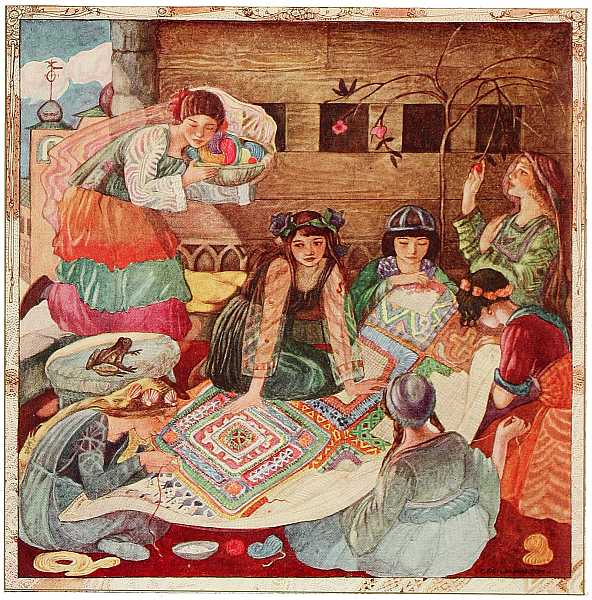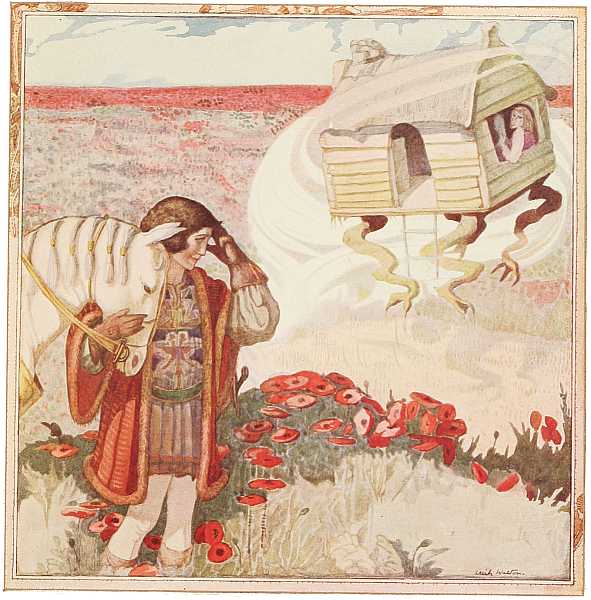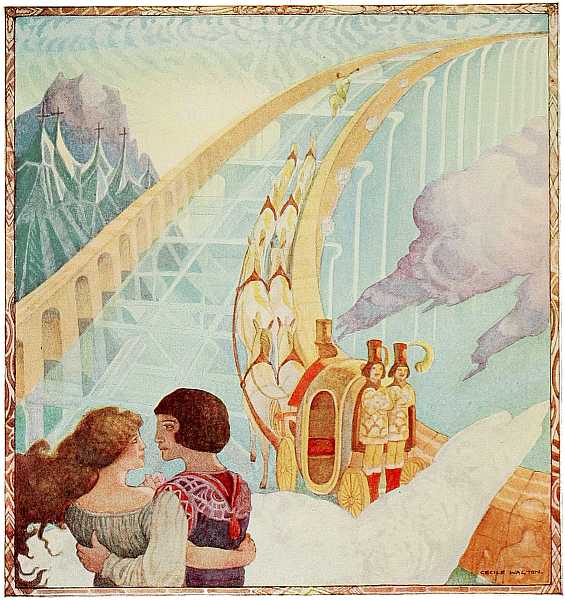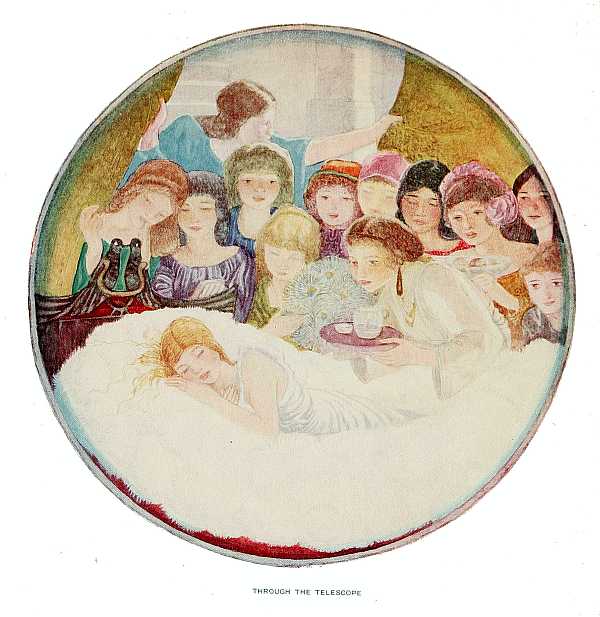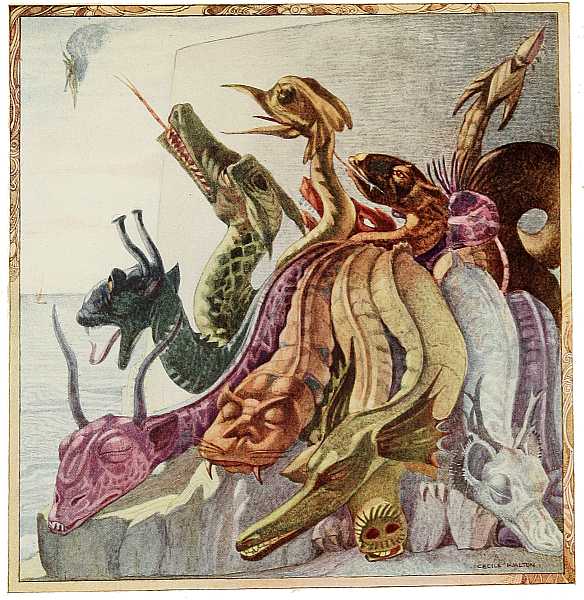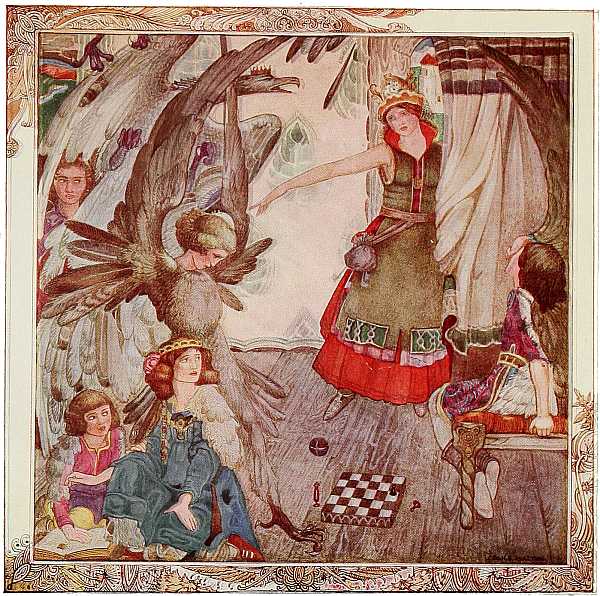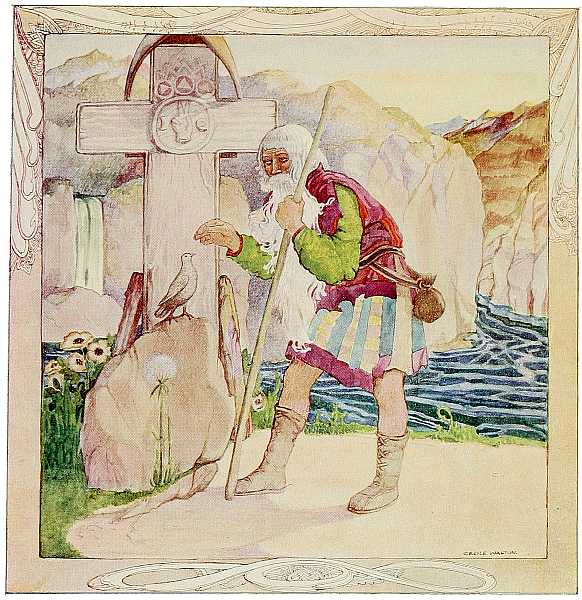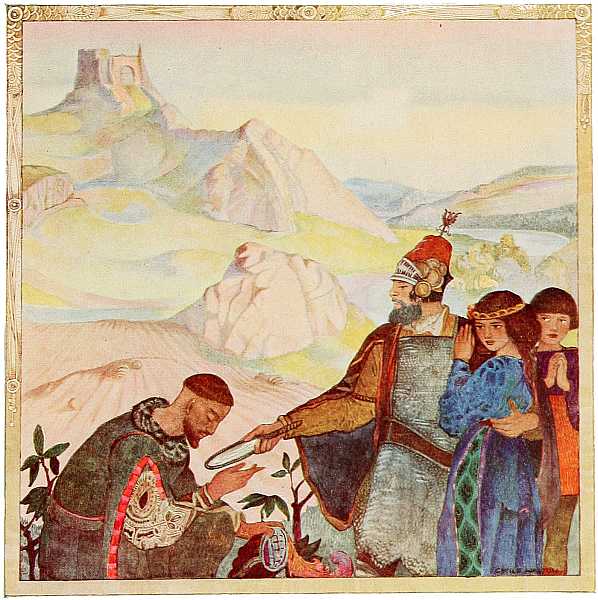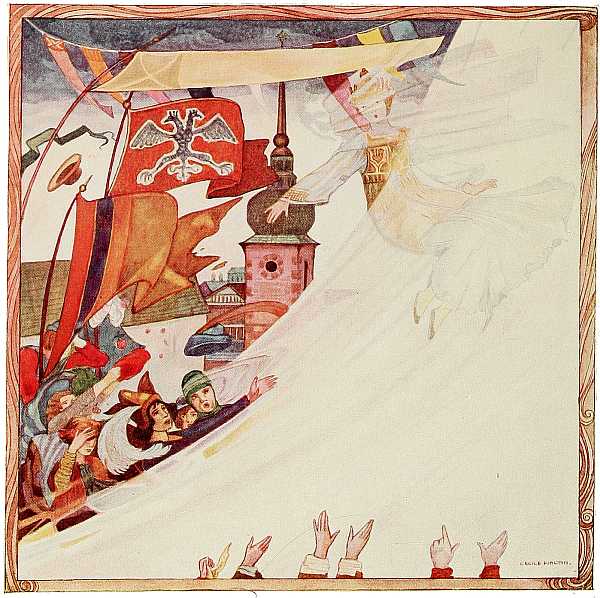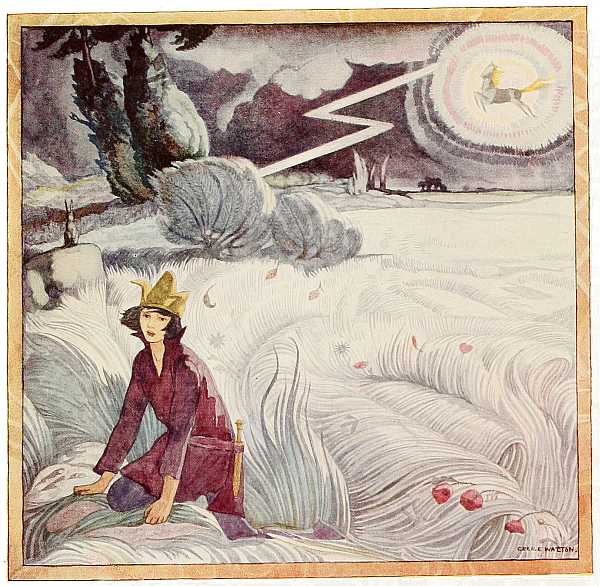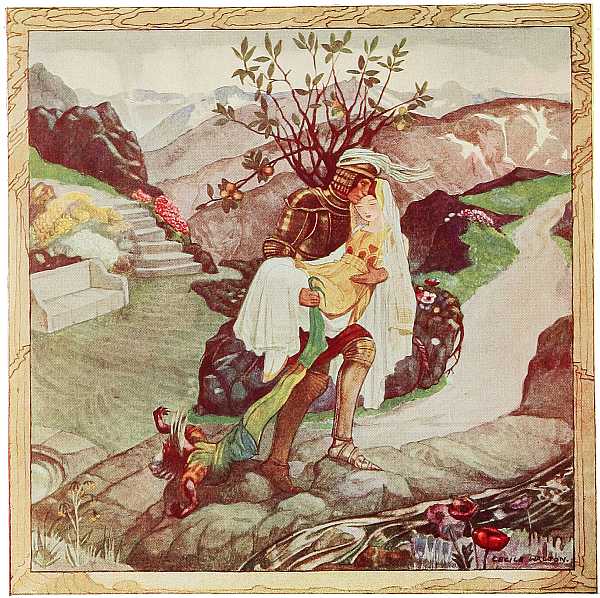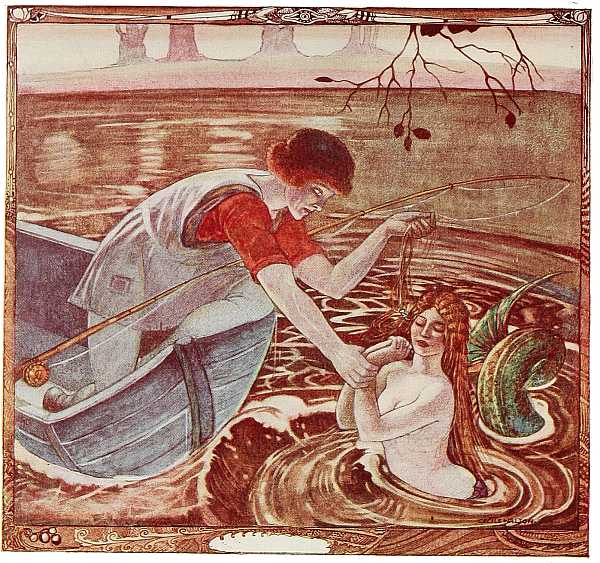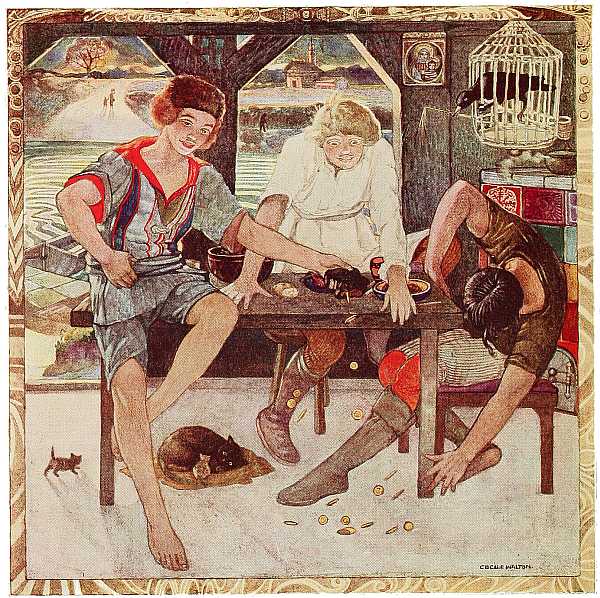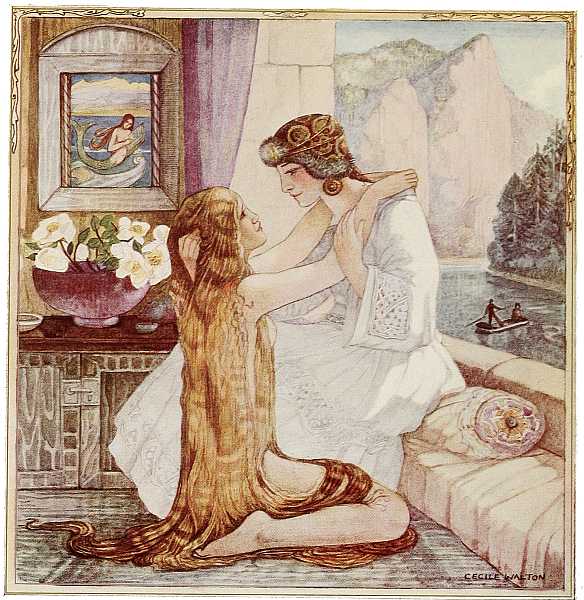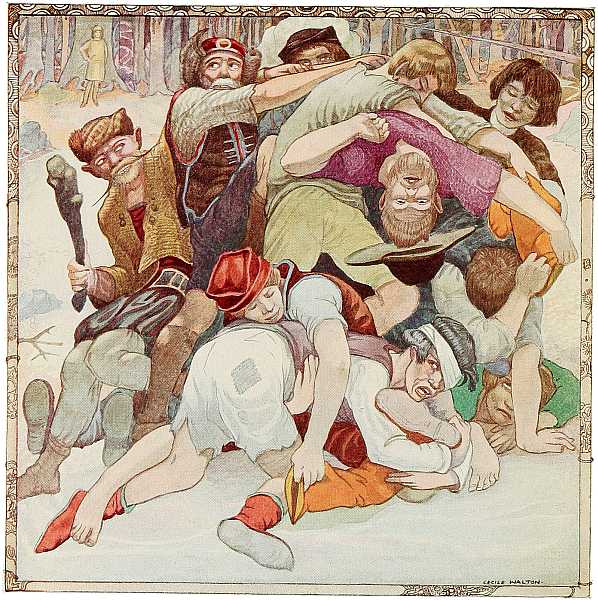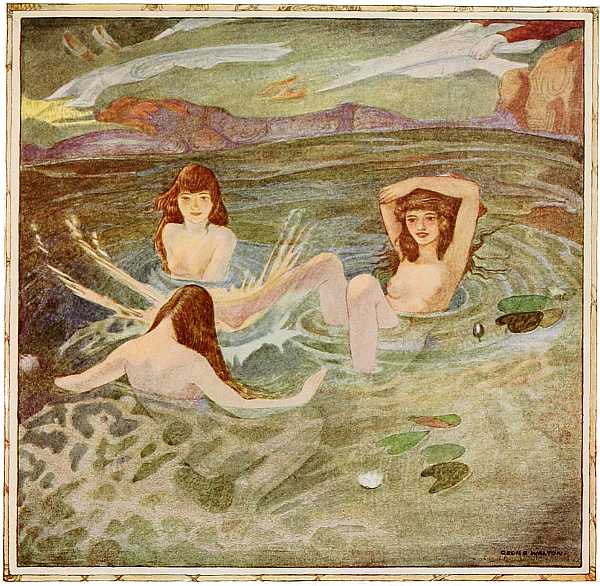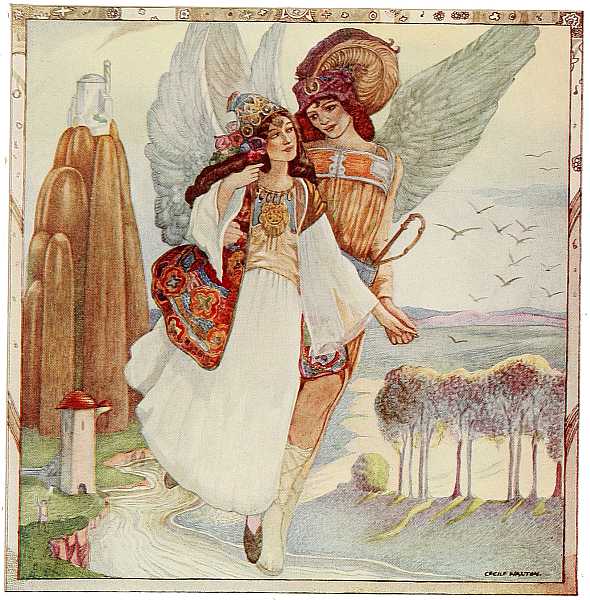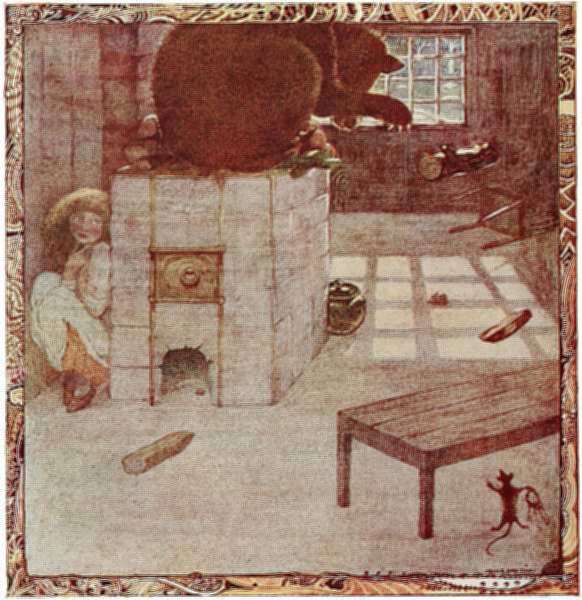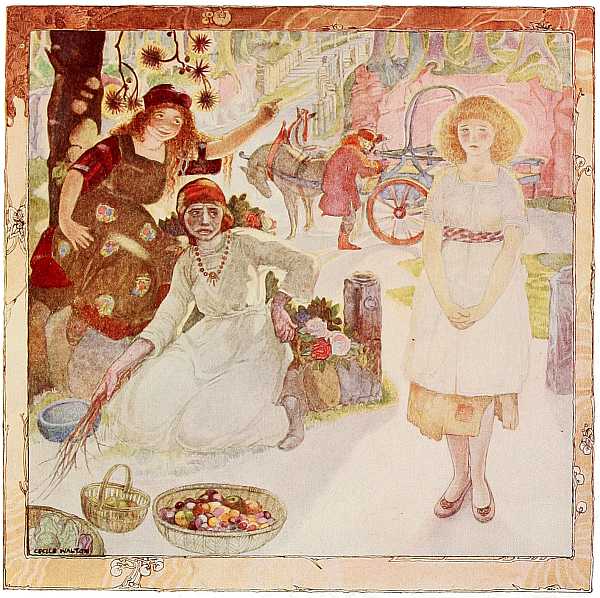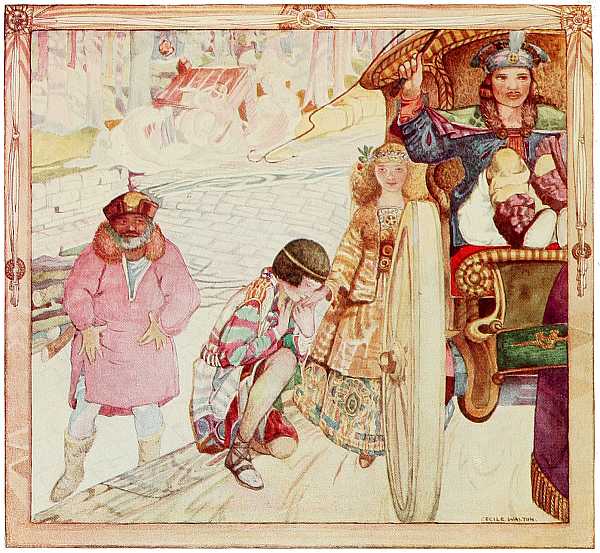THE FAIRY GIRLS MAKE THE CARPET
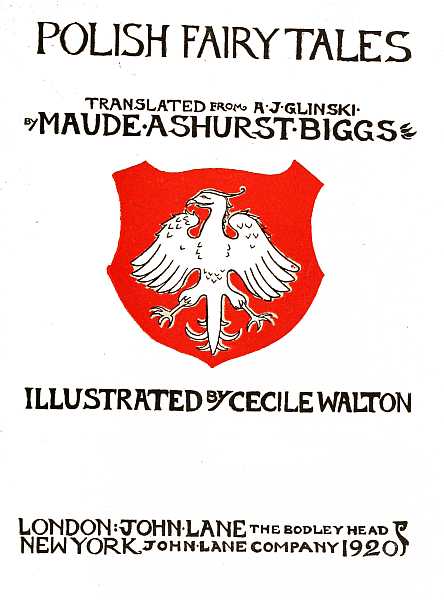
POLISH FAIRY TALES
TRANSLATED from A J GLINSKI
By MAUDE ASHURST BIGGS
ILLUSTRATED By CECILE WALTON
LONDON: JOHN LANE the bodley head
NEW YORK john lane company 1920
The Mayflower Press, Plymouth, England. William Brendon & Son, Ltd.
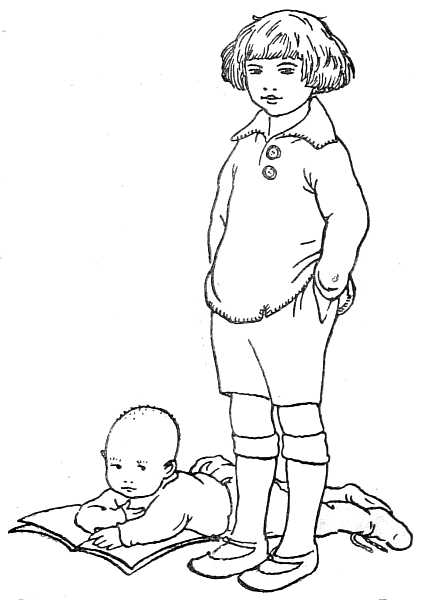
The pictures in this book are dedicated to
my sons .... Gavril and Teddy."
Cecile Walton.
[ix]
TALES FROM POLAND
These are selections from a large collection made by A. J. Glinski, printed at Wilna in 1862. These fairy tales come from a far past and may even date from primitive Aryan times. They represent the folklore current among the peasantry of the Eastern provinces of Poland, and also in those provinces usually known as White Russia.
They were set down by Glinski just as they were related to him by the peasants.
In the translation it was of course necessary to shorten them considerably; the continual repetition—however quaint and fascinating in the original—cannot easily be reproduced. Portions, too, are often told in rhyme, or in a species of rhyming prose that we associate with the ancient ballad. The obvious likenesses between these and the folklore of Germany, the Celtic nations, or to the Indian fairy-tales, will strike every reader.
[xi]
CONTENTS
| PAGE | |
| The Frog Princess | 1 |
| Princess Miranda and Prince Hero | 15 |
| The Eagles | 29 |
| The Whirlwind | 37 |
| The Good Ferryman and the Water Nymphs | 53 |
| The Princess of the Brazen Mountain | 69 |
| The Bear in the Forest Hut | 79 |
| Appendix | 94 |
[xiii]
ILLUSTRATIONS
| The Fairy Girls Make the Carpet |
FRONTISPIECE
TO FACE PAGE |
| The Little House Turns | 10 |
| The Way Home | 13 |
| Through the Telescope | 15 |
| The Dragon who Kept Watch | 25 |
| The Children Transformed | 29 |
| The Old Man Blesses the Princess | 31 |
| To Trick the Basilisk | 36 |
| The Bride Carried off by the Whirlwind | 37 |
| The Horse Appears in the Storm | 42 |
| The Dwarf Defeated | 49 |
| The Good Ferryman Captures the Mermaid | 53 |
| The Purse that was Ever Full | 55 |
| The Meeting of the Sisters | 63 |
| The Fight for the Magic Boots | 69 |
| The Prince Steals the Wings | 70 |
| The Truant Wife is Captured | 77 |
| The Mouse Saves the Good Little Girl | 79 |
| The Good Little Girl is Sent Away | 80 |
| The Reward of the Good Little Girl | 93 |
POLISH FAIRY TALES
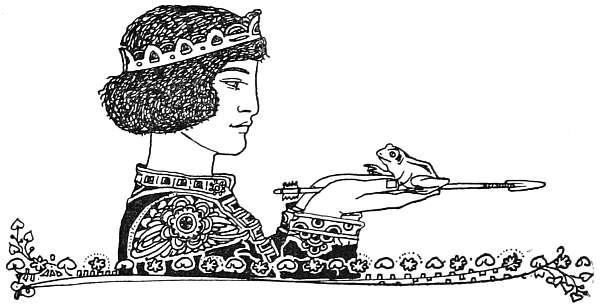
THE FROG PRINCESS
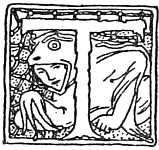 HERE was once a king, who was very old; but he had three grown-up sons. So he
called them to him, and said:
HERE was once a king, who was very old; but he had three grown-up sons. So he
called them to him, and said:
"My dear sons, I am very old, and the cares of government press heavily upon me. I must therefore give them over to one of you. But as it is the law among us, that no unmarried prince may be King, I wish you all to get married, and whoever chooses the best wife shall be my successor."
So they determined each to go a different way, and settled [2] it thus. They went to the top of a very high tower, and each one at a given signal shot an arrow in a different direction to the others. Wherever their arrows fell they were to go in search of their future wives.
The eldest prince's arrow fell on a palace in the city, where lived a senator, who had a beautiful daughter; so he went there, and married her.
The second prince's arrow struck upon a country-house, where a very pretty young lady, the daughter of a rich gentleman, was sitting; so he went there, and proposed to her, and they were married.
But the youngest prince's arrow shot through a green wood, and fell into a lake. He saw his arrow floating among the reeds, and a frog sitting thereon, looking fixedly at him.
But the marshy ground was so unsafe that he could not venture upon it; so he sat down in despair.
"What is the matter, prince?" asked the frog.
"What is the matter? Why, I cannot reach that arrow on which you are sitting."
"Take me for your wife, and I will give it to you."
"But how can you be my wife, little frog?"
"That is just what has got to be. You know that you shot your arrow from the tower, thinking that where it fell, you would find a loving wife; so you will have her in me."
"You are very wise, I see, little frog. But tell me, how[3] can I marry you, or introduce you to my father? And what will the world say?"
"Take me home with you, and let nobody see me. Tell them that you have married an Eastern lady, who must not be seen by any man, except her husband, nor even by another woman."
The prince considered a little. The arrow had now floated to the margin of the lake; he took the arrow from the little frog, put her in his pocket, carried her home, and then went to bed, sighing very deeply.
Next morning the king was told that all his sons had got married; so he called them all together, and said:
"Well children, are you all pleased with your wives?"
"Very pleased indeed, father and king."
"Well, we shall see who has chosen best. Let each of my daughters-in-law weave me a carpet by to-morrow, and the one whose carpet is the most beautiful shall be queen."
The elder princes hastened at once to their ladies; but the youngest, when he reached home, was in despair.
"What is the matter, prince?" asked the frog.
"What is the matter? My father has ordered that each of his daughters-in-law shall weave him a carpet, and the one whose carpet proves the most beautiful shall be first in rank. My brothers' wives are most likely working at their looms already. But you, little frog, although you can give[4] back an arrow, and talk like a human being, will not be able to weave a carpet, as far as I can see."
"Don't be afraid," she said; "go to sleep, and before you wake the carpet shall be ready."
So he lay down, and went to sleep.
But the little frog stood on her hind-legs in the window and sang:
Come hither on airy wing;
And all of you straight to my dwelling hie,
And various treasures bring.
Two fleeces I crave of the finest wool,
And of the loveliest flowers a basketful;
From the depths of the ocean bring sands of gold,
And pearl-drops of lustre manifold;
That so I may fashion a carpet bright,
Adorned with fair flow'rets and gems of light,
And weave it in one short day and night,
When my true love's hands must the treasure hold."
There was a gentle murmur of the breezes, and from the
sunbeams descended seven lovely maidens, who floated into
the room, carrying baskets of various coloured wools, pearls,
and flowers. They curtsied deeply to the little frog, and
in a few minutes they wove a wonderfully beautiful carpet;
then they curtsied again, and flew away.
Meanwhile the wives of the other princes bought the most beautifully coloured wools, and the best designs they could find, and worked hard at their looms all the next day.[5]
Then all the princes came before the king, and spread out their carpets before him.
The king looked at the first and the second; but when he came to the third, he exclaimed:
"That's the carpet for me! I give the first place to my youngest son's wife; but there must be another trial yet."
And he ordered that each of his daughters-in-law should make him a cake next day; and the husband of the one whose cake proved the best should be his successor.
The youngest prince came back to his frog wife; he looked very thoughtful, and sighed deeply.
"What is the matter, prince?" she asked.
"My father demands another proof of skill; and I am not so sure that we shall succeed so well as before; for how can you bake a cake?"
"Do not be afraid," she said: "Lie down, and sleep; and when you wake you will be in a happier frame of mind."
The prince went to sleep; and the frog sprang up to the window, and sang:
Come hither on airy wing;
And all of you straight to my dwelling hie,
These various gifts to bring.
From the sunbeams bright
Bring me heat and light;
[6] And soft waters distil
From the pure flowing rill.
From the flowers of the field
The sweet odours they yield.
From the wheatfields obtain
Five full measures of grain,
That so I may bake
In the night-time a cake,
For my true love's sake."
The winds began to rise, and the seven beautiful maidens floated down into the room, carrying baskets, with flour, water, sweetmeats, and all sorts of dainties. They curtsied to the little frog, and got the cake ready in a few minutes; curtsied again, and flew away.
The next day the three princes brought their cakes to the king. They were all very good; but when he tasted the one made by his youngest son's wife, he exclaimed:
"That is the cake for me! light, floury, white, and delicious! I see, my son, you have made the best choice; but we must wait a little longer."
The two elder sons went away much depressed; but the youngest greatly elated. When he reached home he took up his little frog, stroked and kissed her, and said:
"Tell me, my love, how it was that you, being only a little frog, could weave such a beautiful carpet, or make such a delicious cake?"
"Because, my prince, I am not what I seem. I am a[7] princess, and my mother is the renowned Queen of Light, and a great enchantress. But she has many enemies, who, as they could not injure her, were always seeking to destroy me. To conceal me from them she was obliged to turn me into a frog; and for seven years I have been forced to stay in the marsh where you found me. But under this frog-skin I am really more beautiful than you can imagine; yet until my mother has conquered all her enemies I must wear this disguise; after that takes place you shall see me as I really am."
While they were talking two courtiers entered, with the king's orders to the young prince, to come to a banquet at the king's palace, and bring his wife with him, as his brothers were doing by theirs.
He knew not what to do; but the little frog said:
"Do not be afraid, my prince. Go to your father alone; and when he asks for me, it will begin to rain. You must then say that your wife will follow you; but she is now bathing in May-dew. When it lightens say that I am dressing; and when it thunders, that I am coming."
The prince, trusting to her word, set out for the palace; and the frog jumped up to the window, and standing on her hind-legs, began to sing:
Come hither on airy wing;
And all of you straight to my dwelling hie,
These several gifts to bring.
[8]
My beauty of yore;
And my bright youth once more;
All my dresses so fair;
And my jewels so rare;
And let me delight
My dear love by the sight."
Then the seven beautiful damsels, who were the handmaidens of the princess—when she lived with her mother—floated on the sunbeams into the room. They curtsied, walked three times round her, and pronounced some magical words.
Then the frog-skin fell off her, and she stood among them a miracle of beauty, and the lovely princess she was.
Meanwhile the prince, her husband, had arrived at the royal banquet-hall, which was already full of guests. The old king welcomed him warmly, and asked him:
"Where is your wife, my son?"
Then a light rain began to fall, and the prince said:
"She will not be long; she is now bathing herself in May-dew."
Then came a flash of lightning, which illuminated all the palace, and he said:
"She is now adorning herself."
But when it thundered, he ran to the door exclaiming:
"Here she is!"
And the lovely princess came in, seeming to bring the sunshine with her. They all stood amazed at her beauty.[9] The king could not contain his delight; and she seemed to him all the more beautiful, because he thought her the very image of his long-deceased queen. The prince himself was no less astonished and overjoyed to find such loveliness in her, whom he had only as yet seen in the shape of a little frog.
"Tell me, my son," said the king, "why you did not let me know what a fortunate choice you had made?"
The prince told him everything in a whisper; and the king said:
"Go home then, my son, at once, and pick up that frog-skin of hers; throw it in the fire, and come back here as fast as you can. Then she will have to remain just as she is now."
The prince did as his father told him, went home, and threw the frog-skin into the fire, where it was at once consumed.
But things did not turn out as they expected; for the lovely princess, on coming home, sought for her frog-skin, and not finding it, began to cry bitterly. When the prince confessed the truth, she shrieked aloud, and taking out a green poppy-head, threw it at him. He went to sleep at once; but she sprang up to the window, sang her songs to the winds; upon which she was changed into a duck, and flew away.[10]
The prince woke up in the morning, and grieved sadly, when he found his beautiful princess gone.
Then he got on horseback, and set out to find her, inquiring everywhere for the kingdom of the Queen of Light—his princess's mother—to whom he supposed she must have fled.
He rode on for a very, very long time, till one day he came into a wide plain, all covered with poppies in full flower, the odour of which so overpowered him, that he could scarce keep upright in his saddle. Then he saw a queer little house, supported on four crooked legs. There was no door to the house; but knowing what he ought to do, he said:
On your crooked legs free;
Turn your back to the wood,
And your front door to me."
The hut with the crooked legs made a creaking noise,
and turned round, with its door towards the prince.
He went straight in, and found an old fury, whose name
was Jandza, ![]() inside; she was spinning from a distaff,
and singing.
inside; she was spinning from a distaff,
and singing.
[![]() ]
Jandza pronounced Yen-jar.
]
Jandza pronounced Yen-jar.
"How are you, prince?" she said, "what brings you here?"
So the prince told her, and she said:
"You have done wisely to tell me the truth. I know your bride, the beautiful daughter of the Queen of Light; she flies [11]to my house daily, in the shape of a duck, and this is where she sits. Hide yourself under the table, and watch your opportunity to lay hold of her. Hold her fast, whatever shapes she assumes; when she is tired she will turn into a spindle; you must then break the spindle in two, and you will find that which you are seeking."
THE LITTLE HOUSE TURNS
Presently the duck flew in, sat down beside the old fury, and began to preen her feathers with her beak. The prince seized her by the wing. The duck quacked, fluttered, and struggled to get loose. But seeing this was useless she changed herself into a pigeon, then into a hawk, and then into a serpent, which so frightened the prince, that he let her go; on which she became a duck again, quacked aloud, and flew out of the window.
The prince saw his mistake, and the old woman cried aloud:
"What have you done, you careless fellow! you have frightened her away from me for ever. But as she is your bride, I must find some other way to help you. Take this ball of thread, throw it before you, and wherever it goes follow after it; you will then come to my sister's house, and she will tell you what to do next."
So the prince went on day and night, following the ball of thread, till he came to another queer little house, like the first, to which he said the same rhyme, and going in, found the second old fury, and told her his story.[12]
"Hide under the bench," she exclaimed; "your bride is just coming in."
The duck flew in, as before, and the prince caught her by the wing; she quacked, and tried to get away. Then she changed herself into a turkey, then into a dog, then into a cat, then into an eel, so that she slipped through his hands, and glided out of the window.
The prince was in despair; but the old woman gave him another ball of thread, and he again followed it, determining not to let the princess escape again so easily. So going on after the thread, as it kept unwinding, he came to a funny little house, like the two first, and said:
On your crooked legs free;
Turn your back to the wood,
And your front door to me."
The little house turned round, so that he could go in, and he found a third old fury inside; much older than her sisters, and having white hair. He told her his story, and begged for help.
"Why did you go against the wishes of your clever and sensible wife?" said the old woman. "You see she knew better than you what her frog-skin was good for; but you must needs be in such a hurry to display her beauty, to gain the world's applause, that you have lost her; and she was forced to fly away from you."
THE WAY HOME
[13]
The prince hid himself under the bench: the duck flew in and sat at the old woman's feet; on which he caught her by the wings.
She struggled hard; but she felt his strength was too great for her to resist; so she turned herself into a spindle at once. He broke it across his knee.... And lo! and behold! instead of the two halves of the spindle he held the hands of his beautiful princess, who looked at him lovingly with her beautiful eyes, and smiled sweetly.
And she promised him that she would always remain as she was then, for since her mother's enemies were all dead she had nothing to fear.
They embraced each other, and went out of the old fury's hut. Then the princess spoke some magical spells; and in the twinkling of an eye there appeared a wonderful bridge, reaching from where they stood hundreds of miles, up to the very gallery of the palace, belonging to the prince's father. It was all made of crystal, with golden hand-rails, and diamond bosses upon them.
The princess spoke some more magical words, and a golden coach appeared, drawn by eight horses, and a coachman, and two tall footmen, all in golden liveries. And there were four outriders on splendid horses, riding by the side of the coach, and an equerry, riding in front, and blowing a brazen trumpet. And a long procession of followers, in splendid dresses, came after them.[14]
Then the prince and princess got into the golden coach, and drove away, thus accompanied, along the crystal bridge, till they reached home, when the old king came out to meet them, and embraced them both tenderly. He appointed the prince his successor; and such magnificent festivities were held on the occasion, as never were seen or heard of before.
THROUGH THE TELESCOPE
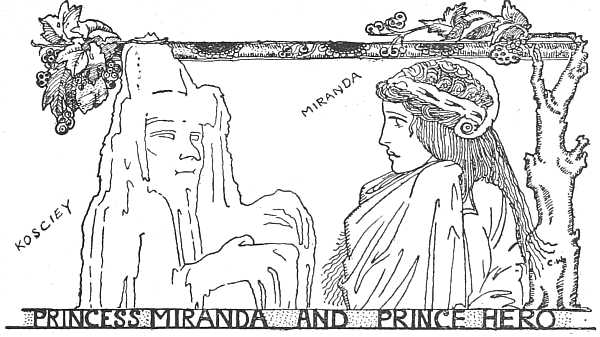
PRINCESS MIRANDA AND PRINCE HERO
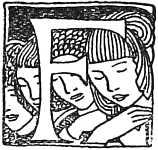 AR away, in the wide ocean there was once
a green island where lived the most beautiful
princess in the world, named Miranda. She
had lived there ever since her birth, and
was queen of the island. Nobody knew who were her
parents, or how she had come there. But she was not
alone; for there were twelve beautiful maidens, who had
grown up with her on the island, and were her ladies-in-waiting.
AR away, in the wide ocean there was once
a green island where lived the most beautiful
princess in the world, named Miranda. She
had lived there ever since her birth, and
was queen of the island. Nobody knew who were her
parents, or how she had come there. But she was not
alone; for there were twelve beautiful maidens, who had
grown up with her on the island, and were her ladies-in-waiting.
But a few strangers had visited the island, and spoken of the princess's great beauty; and many more came in time, and became her subjects, and built a magnificent city, in which she had a splendid palace of white marble to live in.
And in course of time a great many young princes came to[16] woo her. But she did not care to marry any of them; and if anyone persisted, and tried to compel her by force to be his wife, she could turn him and all his soldiers into ice, by merely fixing her eyes upon them.
One day the wicked Kosciey,
![]() the king of the Underground
realm, came out into the upper world, and began to gaze
all round it with his telescope. Various empires and kingdoms
passed in review before him; and at last he saw the green
island, and the rich city upon it; and the marble palace in
this city, and in this palace the twelve beautiful young ladies-of-honour,
and among them he beheld, lying on a rich couch
of swansdown, the Princess Miranda asleep. She slept like
an innocent child, but she was dreaming of a young knight,
wearing a golden helmet, on a gallant steed, and carrying an
invisible mace, that fought of itself; ... and she loved
him better than life.
the king of the Underground
realm, came out into the upper world, and began to gaze
all round it with his telescope. Various empires and kingdoms
passed in review before him; and at last he saw the green
island, and the rich city upon it; and the marble palace in
this city, and in this palace the twelve beautiful young ladies-of-honour,
and among them he beheld, lying on a rich couch
of swansdown, the Princess Miranda asleep. She slept like
an innocent child, but she was dreaming of a young knight,
wearing a golden helmet, on a gallant steed, and carrying an
invisible mace, that fought of itself; ... and she loved
him better than life.
[![]() ]
Kosciey pronounced Kósh-che-eh, literally "Boney."
]
Kosciey pronounced Kósh-che-eh, literally "Boney."
Kosciey looked at her; he was delighted with her beauty; he struck the earth three times, and stood upon the green island.
Princess Miranda called together her brave army, and led them into the field, to fight the wicked Kosciey. But he, blowing on them with his poisonous breath, sent them all fast asleep, and he was just going to lay hands upon the princess, when she, throwing a glance of scorn at him, changed him into a lump of ice, and fled to her capital.
[17]
Kosciey did not long remain ice. So soon as the princess was away, he freed himself from the power of her glance, and regaining his usual form, followed her to her city. Then he sent all the inhabitants of the island to sleep, and among them the princess's twelve faithful damsels.
She was the only one whom he could not injure; but being afraid of her glances, he surrounded the castle—which stood upon a high hill—with an iron rampart, and placed a dragon with twelve heads on guard before the gate, and waited for the princess to give herself up of her own accord.
The days passed by, then weeks, then months, while her kingdom became a desert; all her people were asleep, and her faithful soldiers also lay sleeping on the open fields, their steel armour all rusted, and wild plants were growing over them undisturbed. Her twelve maidens were all asleep in different rooms of the palace, just where they happened to be at the time; and she herself, all alone, kept walking sadly to and fro in a little room up in a tower, where she had taken refuge—wringing her white hands, weeping, and her bosom heaving with sighs.
Around her all were silent, as though dead; only every now and then, Kosciey, not daring to encounter her angry glance, knocked at the door asking her to surrender, promising to make her queen of his Underground realm. But it was all of no use; the princess was silent, and only threatened him with her looks.[18]
But grieving in her lonely prison Princess Miranda could not forget the lover of whom she had been dreaming; she saw him just as he had appeared to her in her dream.
And she looked up with her blue eyes to heaven, and seeing a cloud floating by, she said:
Stay, and hearken my piteous sighing!
In my sorrow I call upon thee;
Oh! where is my loved one? say!
Oh! where do his footsteps stray?
And does he now think of me?"
"I know not," the cloud replied. "Ask the wind."
And she looked out into the wide plain, and seeing how the wind was blowing freely, she said:
Do thou pity my grief and crying!
Have pity on me!
Oh! where is my loved one? say!
Oh! where do his footsteps stray?
And does he now think of me?"
"Ask the stars," the wind replied; "they know more than I do."
So she cried to the stars:
Look down on my tears fast flowing!
Have pity, have pity on me!
Oh! where is my loved one? say!
Oh! where do his footsteps stray?
And does he now think of me?"
"Ask the moon," said the stars; "who being nearer to the earth, knows more of what happens there than we do."
So she said to the moon:
From the starry skies, o'er this land of sleep,
Look down now, and pity me!
Oh! where is my loved one? say!
Where? where do his footsteps stray?
And does he now think of me?"
"I know nothing about your loved one, princess," replied the moon; "but here comes the sun, who will surely be able to tell you."
And the sun rose up in the dawn, and at noontide stood just over the princess's tower, and she said:
Look on me, in this prison undone!
Have pity on me!
Oh! where is my loved one? say!
Through what lands do his footsteps stray?
And does he now think of me?"
"Princess Miranda," said the sun; "dry your tears, comfort your heart; your lover is hastening to you, from the bottom of the deep sea, from under the coral reefs; he has won the enchanted ring; when he puts it on his finger, his army will increase by thousands, regiment after regiment, with horse and foot; the drums are beating, the sabres gleaming, the colours flying, the cannon roaring, they are[20] bearing down on the empire of Kosciey. But he cannot conquer him by force of mortal weapons. I will teach him a surer way; and there is good hope that he will be able to deliver you from Kosciey, and save your country. I will hasten to your prince. Farewell."
The sun stood over a wide country, beyond the deep seas, beyond high mountains, where Prince Hero in a golden helmet, on a gallant horse, was drawing up his army, and preparing to march against Kosciey, the besieger of the fair princess. He had seen her three times in a dream, and had heard much about her, for her beauty was famous throughout the world.
"Dismiss your army," said the sun. "No army can conquer Kosciey, no bullet can reach him; you can only free Princess Miranda by killing him, and how you are to do it, you must learn from the old woman Jandza; I can only tell you where you will find the horse, that must carry you to her. Go hence towards the East; you will come to a green meadow, in which there are three oak trees; and among them you will find hidden in the ground an iron door, with a brazen padlock; behind this door you will find a battle charger, and a mace; the rest you will learn afterwards; ... farewell!"
Prince Hero was most surprised; but he took off his enchanted ring and threw it into the sea; with it all his great army vanished directly into mist, leaving no[21] trace behind. He turned to the East and travelled onwards.
After three days he came to the green meadow, where he found the three oak trees, and the iron door, as he had been told. It opened upon a narrow, crooked stairway, going downwards, leading into a deep dungeon, where he found another iron door, closed by a heavy iron padlock. Behind this he heard a horse neighing, so loudly that it made the door fall to the ground, and at the same moment eleven other doors flew open and there came out a war-horse, which had been shut up there for ages by a wizard.
The prince whistled to the horse; the horse tugged at his fastenings, and broke twelve chains by which he had been fettered. He had eyes like stars, flaming nostrils, and a mane like a thunder-cloud; ... he was a horse of horses, the wonder of the world.
"Prince Hero!" said the horse, "I have long waited for such a rider as you, and I am ready to serve you for ever. Mount on my back, take that mace in your hand, which you see hanging to the saddle; you need not fight with it yourself, for it will strike wherever you command it, and beat a whole army. I know the way everywhere; tell me where you want to go, and you will presently be there."
The prince told him everything; took the self-fighting mace in his hand, and sprang on his back.[22]
The horse reared, snorted, spurned the ground, and they flew over mountains and forests, higher than the flying clouds, over rapid rivers, and deep seas; but when they flew along the ground the charger's light feet never trampled down a blade of grass, nor raised an atom of dust on the sandy soil.
Before sunset Prince Hero had reached the primeval forest in which the old woman Jandza lived.
He was amazed at the size and age of the mighty oaks, pine trees and firs, where there reigned a perpetual twilight. And there was absolute silence—not a leaf or a blade of grass stirring; and no living thing, not so much as a bird, or the hum of an insect; only amidst this grave-like stillness the sound of his horse's hoofs.
The prince stopped before a little house, supported on crooked legs, and said:
On your crooked legs free:
Turn your back to the wood,
And your front to me."
The house turned round, with the door towards him; the prince went in, and the old woman Jandza asked him:
"How did you get here, Prince Hero, where no living soul has penetrated till now?"
"Don't ask me; but welcome your guest politely."
So the old woman gave the prince food and drink, made[23] up a soft bed for him, to rest on after his journey, and left him for the night.
Next morning he told her all, and what he had come for.
"You have undertaken a great and splendid task, prince; so I will tell you how to kill Kosciey. In the Ocean-Sea, on the island of Everlasting Life, there is an old oak tree; under this tree is buried a coffer bound with iron; in this coffer is a hare; under the hare sits a grey duck; this duck carries within her an egg; and in this egg is enclosed the life of Kosciey. When you break the egg he will die at once. Now good-bye, prince; and good luck go with you; your horse will show you the way."
The prince got on horseback, and they soon left the forest behind them, and came to the shore of the ocean.
On the beach was a fisherman's net, and in the net was a great fish, who when he saw the prince, cried out piteously:
"Prince Hero! take me out of the net, and throw me back into the sea; I will repay you!"
The prince took the fish out of the net, and threw it into the sea; it splashed in the water, and vanished.
The prince looked over the sea, and saw the island in the grey distance, far, far away; but how was he to get there? He leaned upon his mace, deep in thought.[24]
"What are you thinking of, prince?" asked the horse.
"I am thinking how I am to get to the island, when I cannot swim over that breadth of sea."
"Sit on my back, prince, and hold fast."
So the prince sat firm on the horse's back, and held fast by the thick mane; a wind arose, and the sea was somewhat rough; but rider and horse pushed on, through the billows, and at last came to shore on the island of Everlasting Life.
The prince took off his horse's bridle, and let him loose to feed in a meadow of luxuriant grass, and walked on quickly to a high hill, where grew the old oak tree. Taking it in both hands he tugged at it; the oak resisted all his efforts; he tugged again, the oak began to creak, and moved a little; he mustered all his strength, and tugged again. The oak fell with a crash to the ground, with its roots uppermost, and there, where they had stood firmly fixed so many hundred years, was a deep hole.
Looking down he saw the iron-bound coffer; he fetched it up, broke open the lock with a stone, raised the lid, picked up the hare lying in it by its ears; but at that moment the duck, which had been sitting under the hare, took the alarm, and flew off straight to sea.
The prince fired a shot after her; the bullet hit the duck; she gave one loud quack, and fell; but in that same instant [25]the egg fell from her—down to the bottom of the sea. The prince gave a cry of despair; but just then a great fish came swimming, dived down to the depths of the sea, and coming to the shore, with the egg in its jaws, left it on the sand.
THE DRAGON WHO KEPT WATCH
The fish swam away; but the prince, taking up the egg, mounted his horse once more; and they swam till they reached Princess Miranda's island, where they saw a great iron wall stretching all round her white marble palace.
There was only one entrance through this iron wall to the palace, and before this lay the monstrous dragon with the twelve heads, six of which kept guard alternately; when the one half slept the other six remained awake. If anyone were to approach the gate he could not escape the horrid jaws. Nobody could hurt the dragon; for he could only suffer death by his own act.
The prince stood on the hill before that gate, and commanded his self-fighting mace, which also had the faculty of becoming invisible, to go and clear his entrance to the palace.
The invisible, self-fighting mace fell upon the dragon and began to thunder on all his heads with such force, that all his eyes became bloodshot, and he began to hiss fiercely; he shook his twelve heads, and stretched wide his twelve horrid jaws; he spread out his forest of claws; but this helped him not at all, the mace kept on smiting him, moving about so[26] fast, that not a single head escaped, but could only hiss, groan, and shriek wildly! Now it had given a thousand blows, the blood gushed from a thousand wounds, and there was no help for the dragon; he raged, writhed about, and shrieked in despair; finally, as blow followed blow, and he could not see who gave them, he gnashed his teeth, belched forth flame, and at length turned his claws upon himself, plunging them deep into his own flesh, struggled, writhed, twisted himself round, and in and out; his blood flowed freely from his wounds ... and now it was all over with the dragon.
The prince, seeing this, went into the courtyard of the palace, put his horse into the stable, and went up by a winding stair, towards the tower, whence the Princess Miranda, having seen him, addressed him:
"Welcome, Prince Hero! I saw how you disposed of the dragon; but do be careful, for my enemy, Kosciey, is in this palace; he is most powerful, both through his own strength, and through his sorceries; and if he kills you I can live no longer.
"Princess Miranda, do not trouble about me. I have the life of Kosciey in this egg." Then he called out:
"Invisible self-fighting mace, go into the palace and beat Kosciey."
The mace bestirred itself quickly, battered in the iron doors, and set upon Kosciey; it smote him on the neck, till[27] he crouched all together, the sparks flew from his eyes, and there was a noise of so many mills in his ears.
If he had been an ordinary mortal it would have been all over with him at once; as it was, he was horribly tormented, and puzzled—feeling all these blows, and never seeing whence they came. He sprang about, raved, and raged, till the whole island resounded with his roaring.
At last he looked through the window, and behold there he saw Prince Hero. "Ah! that is all your doing!" he exclaimed; and sprang out into the courtyard, to rush straight at him, and beat him to a jelly! But the prince held the egg in one hand ready; and he squeezed it so hard, that the shell cracked and the yolk and the white were all spilled together ... and Kosciey fell lifeless!
And with the death of the enchanter all his charms were dissolved at once; all the people in the island who were asleep woke up, and began to stir. The soldiers woke from sleep, and the drums began to beat; they formed their ranks, massed themselves in order, and began to march towards the palace.
And in the palace there was great joy; for Princess Miranda came towards the prince, gave him her white hand, and thanked him warmly. They went to the throne-room, and following the princess's example, her twelve waiting-maids paired off with twelve young officers of the army,[28] and the couples grouped themselves round the throne, on which the prince and princess were sitting.
And then a priest, arrayed in all his vestments, came in at the open door, and the prince and princess exchanged rings, and were married.
And all the other couples were married at the same time, and after the wedding there was a feast, dancing, and music, which it is a pleasure to think of. Everywhere there was rejoicing.
THE CHILDREN TRANSFORMED
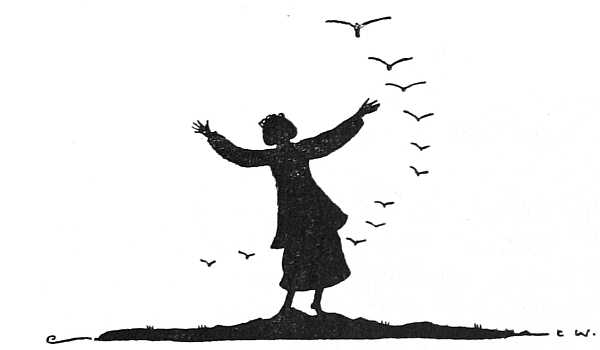
THE EAGLES
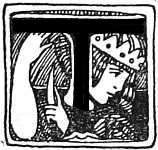 HERE was once a king, who had lost his
wife. They had a family of thirteen—twelve
gallant sons, and one daughter, who was
exquisitely beautiful.
HERE was once a king, who had lost his
wife. They had a family of thirteen—twelve
gallant sons, and one daughter, who was
exquisitely beautiful.
For twelve years after his wife's death the king grieved very much; he used to go daily to her tomb, and there weep, and pray, and give away alms to the poor. He thought never to marry again; for he had promised his dying wife never to give her children a stepmother.
One day, when visiting his dead wife's grave as usual, he saw beside him a maiden so entrancingly fair, that he fell in love with her, and soon made her his second queen. But before long he found out that he had made a great mistake. Though she was so beautiful she turned out to be a wicked[30] sorceress, and not only made the king himself unhappy, but proved most unkind to his children, whom she wished out of the way, so that her own little son might inherit the kingdom.
One day, when the king was far away, at war against his enemies, the queen went into her stepchildren's apartments, and pronounced some magical words—on which every one of the twelve princes flew away in the shape of an eagle, and the princess was changed into a dove.
The queen looked out of the window, to see in what direction they would fly, when she saw right under the window an old man, with a beard as white as snow.
"What are you here for, old man?" she asked.
"To be witness of your deed," he answered.
"Then you saw it?"
"I saw it."
"Then be what I command!"
She whispered some magical words. The old man disappeared in a blaze of sunshine; and the queen, as she stood there, dumb with terror, was changed into a basilisk.
The basilisk ran off in fright; trying to hide herself underground. But her glance was so deadly, that it killed every one she looked at; so that all the people in the palace were soon dead, including her own son, whom she slew by merely looking at him. And this once populous and [31]happy royal residence quickly became an uninhabited ruin, which no one dared approach, for fear of the basilisk lurking in its underground vaults.
THE OLD MAN BLESSES THE PRINCESS
Meanwhile the princess, who had been changed into a dove, flew after her brothers the eagles, but not being able to overtake them, she rested under a wayside cross, and began cooing mournfully.
"What are you grieving for, pretty dove?" asked an old man, with a snow-white beard, who just then came by.
"I am grieving for my poor dear father, who is fighting in the wars far away; for my loved brothers, who have flown away from me into the clouds. I am grieving also for myself. Not long ago I was a happy princess; and now I must wander over the world as a dove, to hide from the birds of prey—and be parted for ever from my dear father and brothers!"
"You may grieve and weep, little dove; but do not lose hope," said the old man. "Sorrow is only for a time, and all will come right in the end."
So saying he stroked the little dove, and she at once regained her natural shape. She kissed the old man's hand in her gratitude, saying:
"How can I ever thank you enough! But since you are so kind, will you not tell me how to rescue my brothers?"[32]
The old man gave her an ever-growing loaf, and said:
"This loaf is enough to sustain, not only you, but a thousand people for a thousand years, without ever diminishing. Go towards the sunset, and weep your tears into this little bottle. And when it is full...."
And the old man told her what else to do, blessed her, and disappeared.
The princess travelled on towards the sunset; and in about a year she reached the boundary of the next world, and stood before an iron door, where Death was keeping guard with his scythe.
"Stop, princess!" he said; "You can proceed no further, for you are not yet parted by death from your own world."
"But what am I to do?" she asked. "Must I go back without my poor brothers?"
"Your brothers," said Death, "fly here every day in the guise of eagles. They want to reach the other side of this door, which leads into the other world; for they hate the one they live in; nevertheless they, and you also, must remain there, until your time be come. Therefore every day I must compel them to go back, which they can do, because they are eagles. But how are you going to get back yourself?—look there!"
The princess looked around her, and wept bitterly. For though she had not perceived this before, nor seen how she[33] got there, she saw now that she was in a deep abyss, shut in on all sides by such high precipices, that she wondered how her brothers, even with eagle wings, could fly to the top.
But remembering what the mysterious old man had said she took courage, and began to pray and weep, till she had filled the little bottle with her tears. Soon she heard the sound of wings over her head, and saw twelve eagles flying.
The eagles dashed themselves against the iron portal, beating their wings upon it, and imploring Death to open it to them. But Death only threatened them with his scythe, saying:
"Hence! ye enchanted princes! you must fulfil your penance on earth, till I come for you myself."
The eagles were about to turn and fly, when all at once they perceived their sister. They came round her, and caressed her hands lovingly with their beaks.
She at once began to sprinkle them with her tears from the lachrymatory; and in one moment the twelve eagles were changed back into the twelve princes, and joyfully embraced their sister.
The princess then fed them all round from her ever-growing loaf; but when their hunger was appeased they began to be troubled as to how they were to ascend from the abyss, since they had no longer eagles' wings to fly up.[34]
But the princess knelt down and prayed:
By each labour, prayer and tear,
Come in thine unvanquished power,
Come and aid us in this hour!"
And all at once there shot down from heaven to the depth of the abyss a ray of sunshine, on which descended a gigantic bird, with rainbow wings, a bright sparkling crest, and peacock's eyes all over his body, a golden tail, and silvery breast.
"What are your commands, princess?" asked the bird.
"Carry us from this threshold of eternity to our own world."
"I will, but you must know, princess, that before I can reach the top of this precipice with you on my back, three days and nights must pass; and I must have food on the way, or my strength will fail me, and I shall fall down with you to the bottom, and we shall all perish."
"I have an ever-growing loaf, which will suffice both for you and ourselves," replied the princess.
"Then climb upon my back, and whenever I look round, give me some bread to eat."
The bird was so large that all the princes, and the princess in the midst of them, could easily find place on his back, and he began to fly upwards.
He flew higher and higher, and whenever he looked round at her, she gave him bits of the loaf, and he flew on, and upwards.[35]
So they went on steadily for two nights and days; but upon the third day, when they were hoping in a short time to view the summit of the precipice, and to land upon the borders of this world, the bird looked round as usual for a piece of the loaf.
The princess was just going to break off some to give him, when a sudden violent gust of wind from the bottom of the abyss snatched the loaf from her hand, and sent it whistling downwards.
Not having received his usual meal the bird became sensibly weaker, and looked round once more.
The princess trembled with fear; she had nothing more to give him, and she felt that he was becoming exhausted. In utter desperation she cut off a piece of her flesh, and gave it to him.
Having eaten this the bird recovered strength, and flew upwards faster than before; but after an hour or two he looked round once more.
So she cut off another piece of her flesh; the bird seized it greedily, and flew on so fast that in a few minutes he reached the ground at the top of the precipice. When they alighted, and he asked her:
"Princess, what were those two delicious morsels you gave me last? I never ate anything so good before."
"They were part of my flesh, I had nothing else for you," replied the princess in a faint voice, for she was swooning away with pain and loss of blood.[36]
The bird breathed upon her wounds; and the flesh at once healed over, and grew again as before. Then he flew up again to heaven, and was lost in the clouds.
The princess and her brothers resumed their journey, this time towards the sunrise, and at last arrived in their own country, where they met their father, returning from the wars.
The king was coming back victorious over his enemies, and on his way home had first heard of the sudden disappearance of his children and of the queen, and how his palace was tenanted only by a basilisk with a death-dealing glance.
He was therefore most surprised and overjoyed to meet his dear children once more, and on the way his daughter told him all that had come to pass.
When they got back to the palace the king sent one of his nobles with a looking-glass down into the underground vaults. The basilisk saw herself reflected in this mirror, and her own glance slew her immediately.
They gathered up the remains of the basilisk, and burnt them in a great fire in the courtyard, afterwards scattering the ashes to the four winds. When this was done the king, his sons, and his daughter, returned to live in their former home and were all as happy as could be ever after.
TO TRICK THE BASILISK
THE BRIDE CARRIED OFF BY THE WHIRLWIND
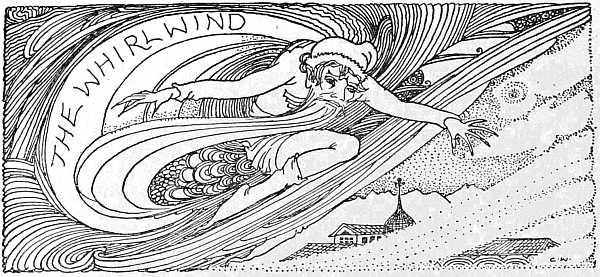
THE WHIRLWIND
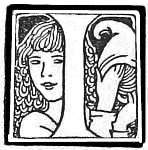 N a far-off country, beyond the sea and the
mountains, there lived a king and queen,
with a beautiful daughter, who was called
Princess Ladna.
N a far-off country, beyond the sea and the
mountains, there lived a king and queen,
with a beautiful daughter, who was called
Princess Ladna.
A great many princes came to woo her; but she liked only one of them, called Prince Dobrotek; so they confessed their love for one another to the king, who gave his consent, and the wedding-day was fixed.
Now among the princess's rejected suitors there was one, who though he had changed himself into the shape of a prince, in order to come to court and make love to her, really was an ugly dwarf, only seven inches high, but with a beard more than seven feet long, and a great hump on his back. He was so offended with the princess for refusing him, that he determined to carry her off; so he watched his opportunity.[38]
As the young couple, with all their followers and their guests, were leaving the palace to go to church, a violent wind began to blow, a regular whirlwind, raising a column of sand, and lifting the princess off her feet. She was carried up over the clouds, to the top of some inaccessible mountains, and dropped down into a magnificent palace, with a golden roof, and a high wall all round.
After a while the princess woke up from the fainting-fit into which she had fallen. She looked round the splendid apartment in which she was, and came to the conclusion that some young and handsome prince must have carried her off.
In the room there was a table ready spread; all the plates and dishes, as well as the knives, forks, and spoons, were of silver and gold; and the dinner itself was so good, that in spite of her grief and terror, she could not refrain from tasting it; and she had no sooner tasted, than she ate, till her appetite was appeased.
Then the doors opened, and there came in a company of negroes, bearing a great chair, in which sat the ugly dwarf, with the long beard and the great hump.
The dwarf now began to pay his court to the princess, and explain how he had carried her off in the guise of the whirlwind, because he loved her so much. But she would not listen to him, and gave him a sounding slap with her open hand right in his face, so that sparks danced before his[39] eyes. Of course he was in a great passion; but for love of her he managed to keep his temper, and turned round to leave the room. But in his haste he caught his feet in his long beard, and was thrown down on the threshold, and in his fall he dropped his cap, which he was holding in one hand.
The negroes helped him again into the chair, and carried him out; but the princess jumped up, locked the door, and took up the cap that was lying on the ground. She put it on; and went to the glass to see how she looked in it. But what was her surprise to find that she could not see herself, till she took it off! So she came to the wise conclusion that this was an invisible cap; at which she was highly delighted; she put on the cap again, and began to walk about the room.
The door opened once more with a loud noise, and the dwarf came in with his long beard thrown back and twisted all round his hump, to be out of the way. But not seeing either his cap, or the princess, he guessed what had happened; so full of wild despair he began to rush madly about the room, knocking himself against the tables and chairs, while the princess made her escape through the door, and ran out into the garden.
The garden was very extensive, and full of beautiful fruit-trees; so she lived upon these fruits, and drank the water of a spring in the garden for some time. She used to make fun of the dwarf's impotent rage. Sometimes when he rushed[40] wildly about the garden, she would tease him by taking off the invisible cap, so that he saw her before him, in all her beauty; but when he made a rush after her she would put it on again, and become invisible to him; she would then throw cherry-stones at him, come close to him, and laugh loudly: and then run away again.
One day, when she was playing about in this manner, her cap got caught in the boughs of a tree, and fell upon a gooseberry bush. The dwarf saw it, and seized hold of the princess with one hand, and of the cap with the other. But just then—from the summit of the mountain, above the garden itself, was heard the sound of a trumpet-challenge, three times repeated.
At this the dwarf trembled with rage; but first breathing upon the princess, he put her to sleep with his breath, then placed his invisible cap on her head. Having done this he seized his two-edged sword, and flew up into the clouds, so as to strike the knight who had challenged him from above, and destroy him at one stroke.
But where did this knight come from?
When Princess Ladna had been carried off on her wedding-day by the whirlwind, there was the greatest consternation among all the bystanders. Her distracted father and her bridegroom rushed about in all directions, and sent courtiers everywhere in search of her; but the princess had been neither seen nor heard of, nor was any trace left of her.[41]
The king (very unnecessarily) told Prince Dobrotek that if he did not get back his daughter, the princess, he would not only put him to death, but would reduce his whole country to ashes. He also told all the princes there that whoever should bring back his daughter should have her to wife, and receive half of his kingdom into the bargain.
When they heard this they all got to horse, and galloped in various directions; among them Prince Dobrotek.
He went on for three days, never stopping for food or rest; but on the fourth day, at dusk, he felt overcome by sleep; so he let his horse go free in a meadow, and himself lay down on the grass. Then all at once he heard a piercing shriek, and straight before him beheld a hare, and an owl perched upon it—its claws digging into the poor creature's side.
The prince caught up the first thing that lay near him, and aimed at the screech-owl, so truly that he killed it on the spot, and the hare ran up to him, like a tame creature, licked his hands, and ran away.
Then the prince saw that the thing he had thrown at the owl was a human skull. And it spoke to him, in these words:
"Prince Dobrotek, I thank you for what you have done for me. When I was alive I committed suicide, and was therefore condemned to lie unburied at this cross-way, till I should be the means of saving life. I have lain here[42] for seven hundred and seventy-seven years; and Heaven knows how much longer I should have had to remain, if you had not chanced to throw me at the screech-owl, and so saved the life of the poor hare. Now bury me, so that I may lie peacefully in the ground at this same place, and I will tell you how to summon the Grey Seer-horse, with the golden mane, who will always help you in case of need. Go out into a plain, and without looking behind you, call out:
Like a bird—and not like steed,
On the blast—and not the mead,
Fly thou hither unto me!"
Thus having spoken, the head was silent; but a blue light shot up from it towards the sky; it was the soul of the deceased, which having now expiated its sin by its long imprisonment in the skull, had attained heaven.
The prince then dug a grave, and buried the skull. He then called out:
Like a bird—and not like steed,
On the blast—and not the mead,
Do thou hither fly to me!"
The wind rose, the lightning flashed, the thunder roared, and the wonderful horse with the golden mane appeared. He flew as fast as the storm-wind, flames shot from his [43]nostrils, sparks from his eyes, and clouds of smoke from his mouth. He stood still, and said in human tones:
THE HORSE APPEARS IN THE STORM
"What are your commands, Prince Dobrotek?"
"I am in trouble; I wish you to help me."
And he told him all that had occurred.
"Creep in at my left ear," said the horse, "and creep out again at the right."
So the prince crept in at the horse's left ear, and came out again at the right one, all clad in golden armour. He also found himself miraculously increased in strength, so that when he stamped on the ground it trembled; and when he shouted a storm arose, which shook the leaves from the trees.
Then he asked the horse:
"What is to be done next?"
"Your betrothed, Princess Ladna," said the horse, "was carried off by the seven-inch-high dwarf, with the seven-foot-long beard; he is a powerful magician; he dwells beyond the seven seas, among inaccessible mountains. He can only be conquered by the All-Cutting Sword, which sword is jealously guarded by his own brother, the Giant-Head, with basilisk eye. To this Giant-Head we must therefore go."
Prince Dobrotek mounted on horseback, and they flew like an arrow, over lands and seas, high mountains and wide oceans. They stopped at length upon a wide plain[44] strewn with bones, before a moving mountain. And the horse said:
"This moving mountain, which you see before you, is the giant's head with the basilisk eyes; and the bones strewn so thickly hereabouts prove how deadly his looks are—so be careful. He is now asleep from the heat of the sun; but only two steps before him lies the sword, with which alone you can conquer your enemy. Lie down along my back, so that his glance cannot reach you through my neck and mane; but when you get near to it, lay hold of the sword; when you have it you will not only be safe from his basilisk glances, but you will even have the giant's head at your mercy."
And the horse drew near lightly, and the prince bent down, and secured the wonderful sword; but he shouted so loud that the Giant-Head woke up, sniffed hard, and looked about with his bloodshot eyes; and seeing the wonderful sword in the prince's hand, he called out:
"Sir knight! are you weary of the world, that you court speedy death?"
"You need not boast like that, you empty head!" replied Prince Dobrotek. "Your looks cannot hurt me now; and you shall die by this All-Cutting Sword! But I would first know who, and what you are."
"Then I confess, prince," replied the head; "that I am in your power; but be merciful to me, for I am worthy[45] of pity. I am a knight of the race of giants, and were it not for the envy of my brother, I should still have been happy. He was the black sheep of our family, and was born an ugly dwarf, with a long beard; and my handsome giant-like proportions caused him to hate me bitterly. His only good point is his great strength, and it all resides in his long beard, and so long as it is not cut he cannot be conquered, and this can only be done by that sword, which you now hold.
"One day, being bent upon my destruction, he said to me:
"'Brother, do not refuse to help me. I have read in my books of magic that beyond the mountains, on a plain lies buried a certain sword, whereby a knight, seeking for his betrothed, shall compass the destruction of us both; let us therefore go and dig it up, so that we shall escape the threatened doom!'
"To this I agreed. I took a hundred-year-old pine—torn up from its roots—on one arm, and carried my brother on my other. We set out; he showed me the spot, and I dug up the sword, on this same plain. Then we began to quarrel about who should possess it. After a long dispute he said:
"'We were best decide it by lot, brother. Let each of us lay his ear to the ground, and whoever first hears the sound of the evening bell shall have the sword.'[46]
"So he laid his ear to the ground, and I mine. I listened; but heard nothing; and he meantime, having got hold of the sword, crept up to me, and cut my head from my shoulders.
"My headless trunk, left unburied, rotted away, and the grass grew over it; but my head, endowed with supernatural life by the malicious dwarf, my brother, was left here, with charge to guard this sword, and kill every one who came near with my deadly glance. After many centuries you have won it; so I implore you to cut off his seven-foot beard, and make him into mince-meat; and avenge me."
"You shall be avenged," said the prince; "and at once. Grey Seer-Horse, carry me to the kingdom of the dwarf magician, with the seven-foot-long beard."
So they set off at once, flying with lightning speed through the air, over the seas and over the forests. In an hour or two they halted on the summit of a high mountain, and the horse said:
"These mountains are the kingdom of the dwarf magician, who carried off your betrothed, and they are both now in the garden; challenge him to fight."
Prince Dobrotek sounded a challenge three times, and the dwarf, as we have seen, flew up into the air, so as to swoop down upon his antagonist, unperceived of him.
All at once the prince heard a murmuring sound above him, and he saw when he looked up, the dwarf soaring[47] above him, like an eagle in the clouds—for he had the magic power of increasing his size and strength—with his sword drawn, ready to fall upon him.
The prince sprang aside, and the dwarf came down, with such an impetus, that his head and neck were rammed into the ground.
The prince dismounted, seized the dwarf by the beard, wound it about his left hand, and began to sever it with the All-Cutting Sword.
The dwarf saw that he had to do with no feather-bed knight; so he tugged with all his strength, and flew up again into the clouds; but the prince, holding fast with his left hand to the beard, kept on severing it with his sword, so that he had nearly cut half of it through; and the dwarf became weaker and weaker the more hair he lost, so he began to cry for mercy.
"Drop down to the ground, off which you took me," said the prince.
The dwarf dropped down slowly, but the prince cut off the remainder of his beard and threw him—when thus deprived of his charms and his strength alike—on to the ground, wreathed the severed beard round his own helmet, and entered the palace.
The invisible servants of the dwarf, seeing their master's beard, wreathed about the prince's helmet, threw open all the doors to him at once.[48]
He went through all the rooms; but not finding his princess anywhere, went into the garden, traversing all the paths and lawns, and calling her name. He could find her nowhere.
But thus running from one place to another he chanced to touch the invisible cap; he caught hold of it, and pulled it away from where it was, on the head of the princess, and saw her at once in all her loveliness, but fast asleep.
Overcome with joy, he called her by her name; but she had been cast into such a deep sleep by the dwarf's poisonous breath, that he could not rouse her.
He took her up in his arms, put the invisible cap into his pocket, also picking up the wicked dwarf, whom he carried along with him. He then mounted his horse, flew like an arrow, and in a few minutes stood before the Giant-Head, with the basilisk eyes.
He threw the dwarf into its open jaws, where he was ground at once into powder; the prince then cut up the monstrous head into small pieces, and scattered them all over the plain.
Thus having got rid of both the dwarf and the giant, the prince rode on with the sleeping princess, upon the Golden-Mane horse, and at sunset they came to the same cross-roads, where he had first summoned him.
"Here, prince, we must part," said the Golden-Mane; "but here in the meadow is your own horse, and it is not far[49] to your own home, so creep into my right ear, and come out at my left."
THE DWARF DEFEATED
The prince did as he was told, and came out as he was before. His own horse recognized him, and came running with a joyful neigh to meet his master.
The prince was tired out with the long journey, so, having laid down his betrothed wife, still sleeping, on the soft grass, and covered her up from the cold, he laid down himself and went to sleep.
But that very night, one of Princess Ladna's rejected suitors, riding that way, saw by the light of the moon those two asleep, and he recognized in them the princess, and the prince, his fortunate rival. So first stabbing the latter through with his sabre, he carried off the princess, and bore her on horseback before him to her father.
The king welcomed him rapturously, as his daughter's deliverer. But when he found, to his dismay, that he could not awake her, with all his caresses, he asked the supposed rescuer what this meant.
"I do not know, Sir King," replied the knight. "After I had overtaken and slain the great enchanter, who was carrying off the princess, I found her as she is now, sound asleep."
Prince Dobrotek meanwhile, mortally wounded, had just strength enough left to summon the Wonderful Grey Horse, who came instantly; and seeing what was the matter, flew[50] off to the top of the mountain of Everlasting Life. On its summit were three springs—the Water of Loosening, the Water of Healing, and the Water of Life. He sprinkled the dead prince with all three; Prince Dobrotek opened his eyes, and exclaimed:
"Oh! how well I have slept!"
"You were sleeping the sleep of death," returned the Golden-Mane; "one of your rivals killed you sleeping, and carried off your princess home to her father, pretending to be her deliverer, in the hope of gaining her hand. But do not be afraid; she is still asleep, and only you can awaken her, by touching her forehead with the beard of the dwarf, which you have with you. Go then to her; I must be elsewhere."
The Golden-Mane vanished, and the prince, calling his own horse, and taking with him his invisible cap, betook himself to the court of his loved one's father.
But when he drew near he found that the city was all surrounded by enemies, who had already mastered the outer defences, and were threatening the town itself; and half of its defenders being slain, the rest were thinking of surrender.
Prince Dobrotek put on his invisible cap, and drawing his All-Cutting Sword, fell upon the enemy.
They fell to right and left as the sword smote them on each side, till one half of them were slain, and the rest ran away into the forest.[51]
Unseen by anyone the prince entered the city, and arrived at the royal palace, where the king, surrounded by his knights, was hearing the account of this sudden attack, whereby his foes had been discomfited; but by whom no one could inform him.
Then Prince Dobrotek took off his invisible cap, and appearing suddenly in the midst of the assembly, said:
"King and father! it was I who beat your enemies. But where is my betrothed, Princess Ladna, whom I rescued from the wizard dwarf, with the seven-foot beard? whom one of your knights treacherously stole from me? Let me see her, that I may waken her from her magic sleep."
When the traitor knight heard this he took to his heels; Prince Dobrotek touched the sleeping princess's forehead with the beard, she woke up directly, gazed at him fondly with her lovely eyes, but could not at first understand where she was, or what had happened to her.
The king caught her in his arms, pressed her to his heart, and that very evening he married her to Prince Dobrotek. He gave them half his kingdom, and there was a splendid wedding, such as had never been seen or heard of before.[52]
THE GOOD FERRYMAN CAPTURES THE MERMAID

THE GOOD FERRYMAN AND THE WATER NYMPHS
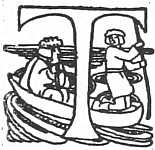 HERE was once an old man, very poor,
with three sons. They lived chiefly by ferrying
people over a river; but he had had
nothing but ill-luck all his life. And to crown
all, on the night he died, there was a great storm, and
in it the crazy old ferry-boat, on which his sons depended
for a living, was sunk.
HERE was once an old man, very poor,
with three sons. They lived chiefly by ferrying
people over a river; but he had had
nothing but ill-luck all his life. And to crown
all, on the night he died, there was a great storm, and
in it the crazy old ferry-boat, on which his sons depended
for a living, was sunk.
As they were lamenting both their father and their poverty, an old man came by, and learning the reason of their sorrow said:
"Never mind; all will come right in time. Look! there is your boat as good as new."
And there was a fine new ferry-boat on the water, in place of the old one, and a number of people waiting to be ferried over.
The three brothers arranged to take turns with the boat, and divide the fares they took.
They were however very different in disposition. The two elder brothers were greedy and avaricious, and would[54] never take anyone over the river, without being handsomely paid for it.
But the youngest brother took over poor people, who had no money, for nothing; and moreover frequently relieved their wants out of his own pocket.
One day, at sunset, when the eldest brother was at the ferry the same old man, who had visited them on the night their father died, came, and asked for a passage.
"I have nothing to pay you with, but this empty purse," he said.
"Go and get something to put in it then first," replied the ferry-man; "and be off with you now!"
Next day it was the second brother's turn; and the same old man came, and offered his empty purse as his fare. But he met with a like reply.
The third day it was the youngest brother's turn; and when the old man arrived, and asked to be ferried over for charity, he answered:
"Yes, get in, old man."
"And what is the fare?" asked the old man.
"That depends upon whether you can pay or not," was the reply; "but if you cannot, it is all the same to me."
"A good deed is never without its reward," said the old man: "but in the meantime take this empty purse; though[55] it is very worn, and looks worth nothing. But if you shake it, and say:
I wish may always be full of gold;'
it will always afford you as much gold as you wish for."
THE PURSE THAT WAS EVER FULL
The youngest brother came home, and his brothers, who were sitting over a good supper, laughed at him, because he had taken only a few copper coins that day, and they told him he should have no supper. But when he began to shake his purse and scatter gold coins all about, they jumped up from the table, and began picking them up eagerly.
And as it was share and share alike, they all grew rich very quickly. The youngest brother made good use of his riches, for he gave away money freely to the poor. But the greedy elder brothers envied him the possession of the wonderful purse, and contrived to steal it from him. Then they left their old home; and the one bought a ship, laded it with all sorts of merchandize, for a trading voyage. But the ship ran upon a rock, and every one on board was drowned. The second brother was no more fortunate, for as he was travelling through a forest, with an enormous treasure of precious stones, in which he had laid out his wealth, to sell at a profit, he was waylaid by robbers, who murdered him, and shared the spoil among them.[56]
The youngest brother, who remained at home, having lost his purse, became as poor as before. But he still did as formerly, took pay from passengers who could afford it, ferried over poor folks for nothing, and helped those who were poorer than himself so far as he could.
One day the same old man with the long white beard came by; the ferry-man welcomed him as an old friend, and while rowing him over the river, told him all that had happened since he last saw him.
"Your brothers did very wrong, and they have paid for it," said the old man; "but you were in fault yourself. Still, I will give you one more chance. Take this hook and line; and whatever you catch, mind you hold fast, and not let it escape you; or you will bitterly repent it."
The old man then disappeared, and the ferry-man looked in wonder at his new fishing-tackle—a diamond hook, a silver line, and a golden rod.
All at once the hook sprang of itself into the water; the line lengthened out along the river current, and there came a strong pull upon it. The fisherman drew it in, and beheld a most lovely creature, upwards from the waist a woman, but with a fish's tail.
"Good ferry-man, let me go," she said; "take your hook out of my hair! The sun is setting, and after sunset I can no longer be a water-nymph again."
But without answering, the ferry-man only held her fast,[57] and covered her over with his coat, to prevent her escaping. Then the sun set, and she lost her fish-tail.
"Now," she said: "I am yours; so let us go to the nearest church and get married."
She was already dressed as a bride, with a myrtle garland on her head, in a white dress, with a rainbow-coloured girdle, and rich jewels in her hair and on her neck. And she held in her hand the wonderful purse, that was always full of gold.
They found the priest and all ready at the church; were married in a few minutes; and then came home to their wedding-feast, to which all the neighbours were invited. They were royally entertained, and when they were about to leave the bride shook the wonderful purse, and sent a shower of gold pieces flying among the guests; so they all went home very well pleased.
The good ferry-man and his marvellous wife lived most happily together; they never wanted for anything, and gave freely to all who came. He continued to ply his ferry-boat; but he now took all passengers over for nothing, and gave them each a piece of gold into the bargain.
Now there was a king over that country, who a year ago had just succeeded to his elder brother. He had heard of the ferry-man, who was so marvellously rich, and wishing to ascertain the truth of the story he had heard, came on purpose to see for himself. But when he saw the ferry-man's beautiful[58] young wife, he resolved to have her for himself, and determined to get rid of her husband somehow.
At that time there was an eclipse of the sun; and the king sent for the ferry-man, and told him he must find out the cause of this eclipse, or be put to death.
He came home in great distress to his wife; but she replied:
"Never mind, my dear. I will tell you what to do, and how to gratify the king's curiosity."
So she gave him a wonderful ball of thread, which he was to throw before him, and follow the thread as it kept unwinding—towards the East.
He went on a long way, over high mountains, deep rivers, and wide regions. At last he came to a ruined city, where a number of corpses were lying about unburied, tainting the air with pestilence.
The good man was sorry to see this, and took the pains to summon men from the neighbouring cities, and get the bodies properly buried. He then resumed his journey.
He came at last to the ends of the earth. Here he found a magnificent golden palace, with an amber roof, and diamond doors and windows.
The ball of thread went straight into the palace, and the ferry-man found himself in a vast apartment, where sat a very dignified old lady, spinning from a golden distaff.
"Wretched man! what are you here for?" she exclaimed,[59] when she saw him. "My son will come back presently and burn you up."
He explained to her how he had been forced to come, out of sheer necessity.
"Well, I must help you," replied the old lady, who was no less than the Mother of the Sun, "because you did Sol that good turn some days ago, in burying the inhabitants of that town, when they were killed by a dragon. He journeys every day across the wide arch of heaven, in a diamond car, drawn by twelve grey horses, with golden manes, giving heat and light to the whole world. He will soon be back here, to rest for the night.... But ... here he comes; hide yourself, and take care to observe what follows."
So saying she changed her visitor into a lady-bird, and let him fly to the window.
Then the neighing of the wonderful horses and the rattling of chariot wheels were heard, and the bright Sun himself presently came in, and stretching himself upon a coral bed, remarked to his mother:
"I smell a human being here!"
"What nonsense you talk!" replied his mother. "How could any human being come here? You know it is impossible."
The Sun, as if he did not quite believe her, began to peer anxiously about the room.[60]
"Don't be so restless," said the old lady; "but tell me why you suffered eclipse a month or two ago."
"How could I help it?" answered the Sun; "When the dragon from the deep abyss attacked me, and I had to fight him? Perhaps I should have been fighting with the monster till now, if a wonderful mermaid had not come to help me. When she began to sing, and looked at the dragon with her beautiful eyes, all his rage softened at once; he was absorbed in gazing upon her beauty, and I meanwhile burnt him to ashes, and threw them into the sea."
The Sun then went to sleep, and his mother again touched the ferry-man with her spindle; he then returned to his natural shape, and slipped out of the palace. Following the ball of thread he reached home at last, and next day went to the king, and told him all.
But the king was so enchanted at the description of the beautiful sea-maiden, that he ordered the ferry-man to go and bring her to him, on pain of death.
He went home very sad to his wife, but she told him she would manage this also. So saying she gave him another ball of thread, to show him which way to go, and she also gave him a carriage-load of costly lady's apparel and jewels, and ornaments—told him what he was to do, and they took leave of one another.
On the way the ferry-man met a youth, riding on a fine grey horse, who asked:[61]
"What have you got there, man?"
"A woman's wearing apparel, most costly and beautiful"—he had several dresses, not simply one.
"I say, give me some of those as a present for my intended, whom I am going to see. I can be of use to you, for I am the Storm-wind. I will come, whenever you call upon me thus:
Help me in my sudden need!'"
The ferry-man gave him some of the most beautiful things he had, and the Storm-wind passed.
A little further on he met an old man, grey-haired, but strong and vigorous-looking, who also said:
"What have you got there?"
"Women's garments costly and beautiful."
"I am going to my daughter's wedding; she is to marry the Storm-wind; give me something as a wedding present for her, and I will be of use to you. I am the Frost; if you need me call upon me thus:
Help me in my sudden need!'"
The ferry-man let him take all he wanted and went on.
And now he came to the sea-coast; here the ball of thread stopped, and would go no further.
The ferry-man waded up to his waist into the sea, and set[62] up two high poles, with cross-bars between them, upon which he hung dresses of various colours, scarves, and ribbons, gold chains, and diamond earrings and pins, shoes, and looking-glasses, and then hid himself, with his wonderful hook and line ready.
As soon as the morning rose from the sea, there appeared far away on the smooth waters a silvery boat, in which stood a beautiful maiden, with a golden oar in one hand, while with the other she gathered together her long golden hair, all the while singing so beautifully to the rising sun, that, if the ferry-man had not quickly stopped his ears, he would have fallen into a delicious reverie, and then asleep.
She sailed along a long time in her silver boat, and round her leaped and played golden fishes with rainbow wings and diamond eyes. But all at once she perceived the rich clothes and ornaments, hung up on the poles, and as she came nearer, the ferry-man called out:
Help me in my sudden need!"
"What do you want?" asked the Storm-wind.
The ferry-man without answering him, called out:
Help me in my sudden need!"
"What do you want?" asked the Frost.
"I want to capture the sea-maiden."
Then the wind blew and blew, so that the silver boat was [63]capsized, and the frost breathed on the sea till it was frozen over.
THE MEETING OF THE SISTERS
Then the ferryman rushed up to the sea-maiden, entangling his hook in her golden hair; lifted her on his horse, and rode off as swift as the wind after his wonderful ball of thread.
She kept weeping and lamenting all the way; but as soon as they reached the ferry-man's home, and saw his wife, all her sorrow changed into joy; she laughed with delight, and threw herself into her arms.
And then it turned out that the two were sisters.
Next morning the ferry-man went to court with both his wife and sister-in-law, and the king was so delighted with the beauty of the latter, that he at once offered to marry her. But she could give him no answer until he had the Self-playing Guitar.
So the king ordered the ferry-man to procure him this wonderful guitar, or be put to death.
His wife told him what to do, and gave him a handkerchief of hers, embroidered with gold, telling him to use this in case of need.
Following the ball of thread he came at last to a great lake, in the midst of which was a green island.
He began to wonder how he was to get there, when he saw a boat approaching, in which was an old man, with a long white beard, and he recognized him with delight, as his former benefactor.[64]
"How are you, ferry-man?" he asked. "Where are you going?"
"I am going wherever the ball of thread leads me, for I must fetch the Self-playing Guitar."
"This guitar," said the old man, "belongs to Goldmore, the lord of that island. It is a difficult matter to have to do with him; but perhaps you may succeed. You have often ferried me over the water; I will ferry you now."
The old man pushed off, and they reached the island.
On arriving the ball of thread went straight into a palace, where Goldmore came out to meet the traveller, and asked him where he was going and what he wanted.
He explained:
"I am come for the Self-playing Guitar."
"I will only let you have it on condition that you do not go to sleep for three days and nights. And if you do, you will not only lose all chance of the Self-playing Guitar; but you must die."
What could the poor man do, but agree to this?
So Goldmore conducted him to a great room, and locked him in. The floor was strewn with sleepy-grass, so he fell asleep directly.
Next morning in came Goldmore, and on waking him up said:
"So you went to sleep! Very well, you shall die!"[65]
And he touched a spring in the floor, and the unhappy ferry-man fell down into an apartment beneath, where the walls were of looking-glass, and there were great heaps of gold and precious stones lying about.
For three days and nights he lay there; he was fearfully hungry. And then it dawned upon him that he was to be starved to death!
He called out, and entreated in vain; nobody answered, and though he had piles of gold and jewels about him, they could not purchase him a morsel of food.
He sought in vain for any means of exit. There was a window, of clearest crystal, but it was barred by a heavy iron grating. But the window looked into a garden whence he could hear nightingales singing, doves cooing, and the murmur of a brook. But inside he saw only heaps of useless gold and jewels, and his own face, worn and haggard, reflected a thousand times.
He could now only pray for a speedy death, and took out a little iron cross, which he had kept by him since his boyhood. But in doing so he also drew out the gold-embroidered handkerchief, given him by his wife, and which he had quite forgotten till now.
Goldmore had been looking on, as he often did, from an opening in the ceiling to enjoy the sight of his prisoner's sufferings. All at once he recognized the handkerchief, as belonging to his own sister, the ferry-man's wife.[66]
He at once changed his treatment of his brother-in-law, as he had discovered him to be; took him out of prison, led him to his own apartments, gave him food and drink, and the Self-playing Guitar into the bargain.
Coming home, the ferry-man met his wife half-way.
"The ball of thread came home alone," she explained; "so I judged that some misfortune had befallen you, and I was coming to help you."
He told her all his adventures, and they returned home together.
The king was all eagerness to see and hear the Self-playing Guitar; so he ordered the ferry-man, his wife, and her sister to come with it to the palace at once.
Now the property of this Self-playing Guitar was such that wherever its music was heard, the sick became well, those who were sad merry, ugly folks became handsome, sorceries were dissolved, and those who had been murdered rose from the dead, and slew their murderers.
So when the king, having been told the charm to set the guitar playing, said the words, all the court began to be merry, and dance—except the king himself!... For all at once the door opened, the music ceased, and the figure of the late king stood up in his shroud, and said:
"I was the rightful possessor of the throne! and you, wicked brother, who caused me to be murdered, shall now reap your reward!"[67]
So saying he breathed upon him, and the king fell dead—on which the phantom vanished.
But as soon as they recovered from their fright, all the nobility who were present acclaimed the ferry-man as their king.
The next day, after the burial of the late king, the beautiful sea-maiden, the beloved of the Sun, went back to the sea, to float about in her silvery canoe, in the company of the rainbow fishes, and to rejoice in the sunbeams.
But the good ferry-man and his wife lived happily ever after, as king and queen. And they gave a grand ball to the nobility and to the people.... The Self-playing Guitar furnished the music, the wonderful purse scattered gold all the time, and the king entertained all the guests right royally.[68]
THE FIGHT FOR THE MAGIC BOOTS
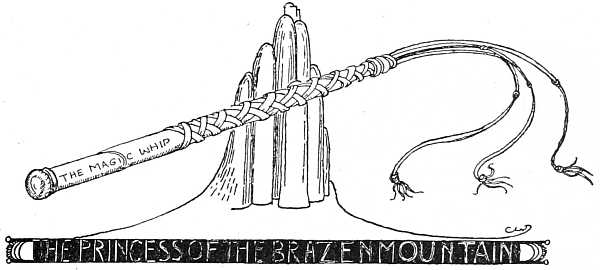
THE PRINCESS OF THE BRAZEN MOUNTAIN
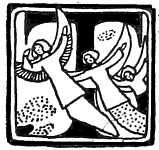 HERE was a young prince, who was not
only most handsome and well-grown, but
also most kind-hearted and good. Now
sooner or later kindness always meets its
reward, though it may not seem so at first.
HERE was a young prince, who was not
only most handsome and well-grown, but
also most kind-hearted and good. Now
sooner or later kindness always meets its
reward, though it may not seem so at first.
One summer's evening the prince was walking on the banks of a lake, when he looked up, and saw to his great surprise, in the air, against the rosy clouds of the sunset, three beautiful beings with wings—not angels, nor birds—but three beautiful damsels.
And having alighted on the ground they dropped their wings and their garments, and left them lying on the shore and leaped into the cool water, and began splashing and playing about in it, like so many waterfowl.
As soon as the prince saw this he came out from his[70] hiding-place in the bushes, picked up one pair of wings and hid himself again.
When they had been long enough in the water, the beautiful damsels came again to land, and dressed themselves quickly.
Two of them soon had on both their white dresses and their wings; but the youngest could not find hers.
They held a short consultation, and the result was, that the two elder flew away in the shape of birds, as fast as they could, to fetch another pair of wings for their younger sister.
They soon vanished in the blue sky; but she remained alone, wringing her hands, and crying.
"What are you crying for, you lovely maiden?" asked the prince, emerging from the bushes.
"Oh! I am so unhappy!" she replied. "I am a princess of the Brazen Mountain; my sisters and I came here to bathe in the lake; and somebody has stolen my wings; so I must wait here, until they bring me another pair."
"I am a prince," he replied; "this is my father's kingdom; be my wife, and I will give you back your wings."
"Very well," she said; "I consent, only you must give me back my wings at once."
"Let us first go to church, and get married," he answered, and taking the lovely princess by the hand, he brought her to [71]his father and mother, and asked their permission to marry her.
THE PRINCE STEALS THE WINGS
The king and queen were delighted with their beautiful daughter-in-law, gave them their blessing, and all was got ready for the wedding.
And directly they came back from church the prince, overcome with joy, kissed his bride, and gave her back her wings.
She took them joyfully, fastened them to her shoulders; then flew out of the window, and vanished.
All the wedding-guests were in consternation; the king looked very serious; the queen wept bitterly; but the prince so grieved after his bride, that, having obtained his parents' consent, he went out into the wide world to search for that Brazen Mountain, where he hoped to find her.
He travelled for a long time, inquiring about it of every one he met; but nobody had ever heard of such a mountain; and he began to give up all hope of ever finding it.
Late one evening he saw a twinkling light before him, which he followed, in the hope of coming to some habitation. It led him on a long way, across level plains, through deep defiles, and at length some way into a dark forest. But at last he came to whence the light proceeded—from a solitary hermitage.
He went in; but found the hermit lying dead, with six wax candles burning around him. He had evidently been[72] dead for some time. Yet there seemed to be nobody near him, nor any inhabitants at all in this desolate region.
The prince's first thought was how to get him buried, and with proper rites, when there was no priest—nor indeed any people at all—to be found in the neighbourhood.
While he was thinking over this, something fell from a peg in the wall, close beside him; it was a leather whip.
The prince took it up, and read on the handle these words:
"The Magic Whip."
As he knew its virtue, he called out:
To right and left skip!
And do what I will!"
The whip jumped from his hand, became invisible, and flew away.
In a short time there was the hum of a multitude through the forest; and the head-forester entered, breathless, followed by a crowd of under-keepers, and many more people with them.
Some set about making a coffin, others began digging a grave, and the head-keeper rode off to fetch a priest.
And as soon as it was dawn mass was said; the bells began ringing from several far-distant churches; and at sunrise the corpse was decently buried. When the funeral was over all the people dispersed to their homes, and the Magical Whip returned of itself to the prince's hand.[73]
He stuck it into his girdle, and went on, till after an hour or two he came to a clearing in the forest, where twelve men were fighting desperately among themselves.
"Stop, you fellows!" exclaimed the prince. "Who are you? and what are you fighting about?"
"We are robbers," they replied, "and we are fighting for these boots, which were the property of our deceased leader. Whoever has them can go seven leagues at one step; and he who gets them will be our leader. As you are a stranger we will abide by your decision, as to whom this pair of boots shall belong, and give you a heap of gold into the bargain for your trouble."
The prince drew on the boots, took the Magical Whip from his girdle, and said:
To right and left skip!
And do what I will!"
The whip jumped from his hand, became invisible, and well thrashed the robbers. In the midst of the confusion the prince made his escape, and having the boots on he went seven miles at every step, and was soon far enough away from the robbers' den.
But as he was no nearer to finding out where the Brazen Mountain was, he had no need to go quite so fast; so he took off the seven-league boots, put them under his arm, and the Magic Whip in his girdle, and went at his ordinary pace,[74] till he came to a narrow path between some rocks, where again he came upon twelve men fighting.
They explained that they were fighting for an invisible cap, which had belonged to their late leader; and asked him, as a stranger, to decide who should have it.
So he set the Magical Whip, as before, to work; and there was a nice confusion among these robbers, for not seeing where the blows came from they fell upon one another; and at last, frightened out of their senses, they took flight, and scattered in all directions. The prince, having put on the invisible cap, was able to walk among them, and talk to them; and they all heard, though they could not see him.
He now began to consider whether he could not use all these treasures to help him to find the Brazen Mountain. So he drew on the seven-league boots, settled the invisible cap on his forehead, and taking the Magical Whip from his girdle, said:
Lead me on; I'll follow thee!
Onward to the Brazen Mountain
Lead me, where I fain would be!"
The whip sprang from his hand. It did not become invisible this time, but glided rapidly a little above the ground, like a boat over a calm sea. Though it flew like a bird, the prince was quite able to keep pace with it, because[75] he had on the seven-league boots. He was scarcely aware of the fact, when in less than a quarter of an hour they came to a standstill—at the Brazen Mountain.
At first the prince was overjoyed at having reached the goal of his wishes; but when he looked more closely at its smooth perpendicular sides, hard as adamant—its summit lost in the clouds—he was in despair; for how was he ever to get to the top of it?
However, he thought there must be some way up after all; so taking off his boots and cap, he set off to walk round the base of the mountain.
In half an hour he came to a mill, with twelve millstones. The miller was an old wizard, with a long beard down to the ground. He stood beside a stove—whereupon a kettle was boiling—stirring the contents with a long iron spoon, and piling wood on the fire.
The prince looked into the kettle.
"Good morning to you, gaffer. What are you doing there?"
"That's my own business," replied the miller gruffly.
"What mill is this?" the prince next asked.
"That's no business of yours," replied the miller.
The prince was not going to be satisfied with this; so he gave his usual orders to the Magical Whip, which forthwith became invisible, and began to lash the miller soundly. He tried to run away; but it was no use; till the prince took[76] pity on him, and called the whip back again. He put it up, and then said:
"Whose mill is this?"
"It belongs to the three princesses of the Brazen Mountain," replied the miller. "They let down a rope here every day, and draw up all the flour they want by the rope."
As he said this a thick silken rope came down, with a loop at the end, which struck the threshold of the mill.
The prince made ready; and when the usual sack of wheat flour was bound fast in the loop, he climbed upon it, having first put on his invisible cap, and was thus drawn up to the top of the Brazen Mountain.
The three princesses, having drawn up their supply of flour, put it into their storehouse, and went back to their dwelling.
Their palace was most beautiful, all silver without, and all gold within. All the windows were of crystal; the chairs and tables were made of diamonds, and the floors of looking-glass. The ceilings were like the sky, with mimic stars and moon shining therein; and in the principal saloon there was a sun, with rays all round; beautiful birds were singing, monkeys were telling fairy tales; and in their midst amongst all this sat three most beautiful princesses.
The two eldest were weaving golden threads in their looms; but the youngest, the prince's wife, sat silently apart from her sisters, listening to the murmur of a fountain, her [77]head leaning on her hand, in deep thought. And as she sat there two pearly tears coursed down her lovely face.
THE TRUANT WIFE IS CAPTURED
"What are you thinking of, sister?" asked the two elder princesses.
"I am thinking of the prince, my husband. I love to think of him, and I am so sorry for him, poor fellow! To think I left him for no fault at all; and when we loved one another so dearly! Oh! sisters! I shall have to leave you, and go back to him; only I fear he will never forgive me, however I entreat him, for having behaved so unkindly to him."
"I forgive you, I forgive you everything, darling!" exclaimed the prince throwing off the invisible cap, and embracing her rapturously.
Then she gave him wings like her own, and they flew away together. In an hour or two they arrived in his father's kingdom.
The king and queen welcomed them joyfully, and all was greatest joy and happiness henceforward.[78]
THE MOUSE SAVES THE GOOD LITTLE GIRL
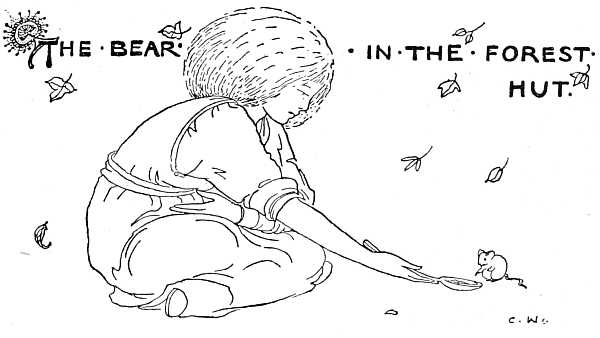
THE BEAR IN THE FOREST HUT.
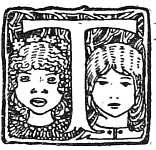 HERE was once an old man, who was a
widower, and he had married an old woman,
who was a widow. Both had had children
by their first marriage; and now the old man
had a daughter of his own still living, and the old woman
also had a daughter.
HERE was once an old man, who was a
widower, and he had married an old woman,
who was a widow. Both had had children
by their first marriage; and now the old man
had a daughter of his own still living, and the old woman
also had a daughter.
The old man was an honest, hard-working, and good-natured old fellow, but too much under his wife's thumb. This was very unfortunate, because she was wicked, cunning, and sly, and a bad old witch.
Her daughter was only too like her in disposition; but she was her mother's darling.
But the old man's daughter was a very good sweet girl;[80] nevertheless her stepmother hated her; she was always tormenting her, and wishing her dead.
One day she had beaten her very cruelly, and pushed her out of doors; then she said to the old man:
"Your wretched daughter is always giving me trouble; she is such an ill-tempered, spoilt hussy, that I cannot do anything with her. So if you wish for peace in the house, you must put her into your waggon, drive her away into the forest, and come back without her."
The old man was very sorry to have to do this; for he loved his own little daughter most dearly. But he was so afraid of his wife that he dared not refuse; so he put the poor girl into his waggon, drove a long way into the forest, took her out, and left her there alone.
She wandered about a long time, gathering wild strawberries, to eat with a little piece of bread, which her father had given her. Towards evening she came to the door of a hut in the forest, and knocked at the door.
Nobody answered her knock. So she lifted the latch, went in, and looked round—there was nobody there.
But there was a table in one corner, and benches all round the walls, and an oven by the door. And near the table, close to the window, was a spinning-wheel, and a quantity of flax.
The girl sat down to the spinning-wheel, and opened the window, looked out, and listened; but nobody came.
THE GOOD LITTLE GIRL IS SENT AWAY
[81]
But as it grew dusk she heard a rustle not far off, and from somewhere not far from the hut, a voice was heard, singing:
Whom the night has overtaken;
If no crime your conscience stain,
In this hut to-night remain."
When the voice ceased, she answered:
Yet unstained by crime am I:
Be you rich, or be you poor;
For this night here let me lie!"
Once more there was a rustle in the branches; the door opened, and there came into the room—a bear!
The girl started up, very frightened; but the bear only said:
"Good evening, pretty maiden!"
"Good evening to you, whoever you are," she replied, somewhat reassured.
"How did you come here?" he asked. "Was it of your own free will, or by compulsion?"
The maiden told him all, weeping; but the bear sat down beside her, and stroking her face with his paw, replied:
"Do not cry, pretty one; you shall be happy yet. But in the meantime you must do just what I tell you. Do you see that flax? You must spin it into thread; of[82] that thread you must weave cloth, and of that cloth you must make me a shirt. I shall come here to-morrow at this same time, and if the shirt is ready I will reward you. Good-bye!"
So saying the bear made her a parting bow, and went out. At first the girl began to cry, and said to herself:
"How can I do this in only twenty-four hours—spin all that flax, weave it into cloth, and make a shirt out of it? Well! I must set to work! and do what I can.... He will at least see that my will was good, though I was unable to perform the task."
Thus saying, she dried her tears, ate some of her bread and strawberries, sat down to the spinning-wheel, and began to spin by the light of the moon.
The time went by quickly, as she worked, and it was daylight before she knew.
And there was no more flax left; she had spun out the last distaff-full.
She was astonished to see how fast the work had gone, and began to wonder how she was to weave the thread without any loom.
Thinking, she fell asleep.
When she woke the sun was already high in the heavens. There was breakfast ready on the table, and a loom under the window.
She ran down to the neighbouring brook, washed her[83] face and hands, came back, said grace, and ate her breakfast; then she sat down to the loom.
The shuttle flew so fast that the cloth was all ready by noon.
She took it out into a meadow, sprinkled it from the brook, spread it out in the sun, and in one hour the cloth was bleached.
She came back with it to the hut, cut out the shirt, and began to stitch at it diligently.
The twilight was falling, and she was just putting in the last stitch, when the door opened, and the bear came in, and asked:
"Is the shirt ready?"
She gave it to him.
"Thank you, my good girl; now I must reward you. You told me you had a bad stepmother; if you like, I will send my bears to tear her and her daughter in pieces."
"Oh! don't do that! I don't want to be revenged; let them live!"
"Let it be so then! Meanwhile make yourself useful in the kitchen; get me some porridge for supper. You will find everything you want in the cupboard in the wall; but I will go and fetch my bedding, for I shall spend to-night at home."
The bear left the room, and the maiden made up the fire in the oven, and began to get the porridge ready.
Just then she heard a sound under the bench, and there[84] ran out a poor, lean little mouse, which stood up on its hind-legs, and said in human tones:
A poor weak, little mouse am I!
I am hungry, give me food;
And to you will I be good."
The girl was sorry for the mouse, and threw it a spoonful of porridge.
The mouse ate it, thanked her, and ran away to its hole.
The bear soon came in, with a load of wood and stones; these he laid upon the stove, and having eaten a basin of porridge, he climbed upon the stove, and said:
"Here, girl, is a bunch of keys on a steel ring. Put out the fire; but you must walk about the room all night, and keep on jingling these keys, till I get up; and if I find you alive in the morning you shall be happy."
The bear began snoring directly, and the old man's daughter kept walking about the hut, jingling the keys.
Soon the mouse ran out of its hole, and said:
"Give me the keys, mistress, I will jingle them for you; but you must hide yourself behind the stove, for the stones will soon be flying about."
So the mouse began to run up and down by the wall, under the bench. The maiden hid behind the oven, and[85] about midnight the bear woke up, and threw out a stone into the middle of the room.
But the mouse kept running about, and jingling the keys. And the bear asked:
"Are you alive?"
"I am," replied the girl, from behind the oven.
The bear began to throw stones and billets of wood, thick and fast from the stove, and every time he did so, he asked:
"Are you alive?"
"I am," replied the girl's voice from behind the oven; and the mouse still ran up and down, jingling the keys.
With the dawn the cocks began to crow, but the bear did not wake. The mouse gave up the keys, and ran back to its hole; but the old man's daughter began to walk about the room, and jingled the keys.
At sunrise the bear came off the stove, and said:
"O daughter of the old man! you are blest of heaven! For here was I, a powerful monarch, changed by enchantment into a bear, until some living soul should spend two nights in this hut. And now I shall soon become a man again, and return to my kingdom, taking you for my wife. But before this comes to pass, do you look into my right ear."
The old man's daughter threw back her hair, and looked into the right ear of the bear. And she saw a beautiful country, with millions of people, with high mountains, deep [86]rivers, impenetrable forests, and pastures covered with flocks, well-to-do villages, and rich cities.
"What seest thou?" asked the bear.
"I see a lovely country."
"That is my kingdom. Look into my left ear."
She looked, and could not enough admire what she saw—a magnificent palace, with many carriages and horses in the courtyard, and in the carriages rich robes, jewels, and all kinds of rarities.
"What do you see?" asked the bear.
She described it all.
"Which of those carriages do you prefer?"
"The one with four horses," she replied.
"That is yours then," answered the bear, as he opened the window.
There was a sound of wheels in the forest, and a golden carriage presently drew up before the cottage drawn by four splendid horses, although there was no driver.
The bear adorned his beloved with a gown of cloth-of-gold, with diamond ear-rings, a necklace set with various precious stones, and diamond rings, saying:
"Wait here a little while; your father will come for you presently; and in a few days, when the power of the enchantment is over, and I am a king again, I will come for you, and you shall be my queen."
So saying the bear disappeared into the forest, and the[87] old man's daughter looked out of the window to watch for her father's coming.
The old man, having left his daughter in the wood, came home very sad; but on the third day he harnessed his waggon again, and drove into the forest, to see if she were alive or dead; and if she were dead at least to bury her.
Towards evening the old woman and her own daughter looked out of the window, and a dog, the favourite of the old man's daughter, suddenly rushed to the door, and began to bark:
Bringing home his daughter dear,
Decked with gold and diamonds' sheen,
Gifts to please a royal queen."
The old woman gave the dog an angry kick. "You lie, you big ugly dog! Bark like this!
His daughter's bones he's bringing home!"
So saying she opened the door; the dog leaped forth; and she went with her daughter into the courtyard. They stood as if transfixed!
For in drove the carriage with four galloping horses, the old man sitting on the box, cracking his whip, and his daughter sat inside, dressed in cloth of gold, and adorned with jewels.
The old woman pretended she was overjoyed to see her,[88] welcomed her with many kisses, and was anxious to know where she got all these rich and beautiful things.
The girl told her that they were all given to her by the bear in the forest hut.
Next day the old woman baked some delicious cakes, and gave them to her own daughter, saying to the old man:
"If your wretched, worthless daughter has had such good luck, I am sure my sweet, pretty darling will get a deal more from the bear, if he can only see her. So you must drive her out in the waggon, leave her in the forest, and come back without her."
And she gave the old man a good push, to hasten his departure, shut the door of the cottage in his face, and looked out of the window to see what would happen.
The old man went to the stable, got out the waggon, put the horse to, helped his stepdaughter in, and drove away with her into the forest.
There he left her, turned his horse's head, and drove quickly home.
The old woman's daughter was not long in finding out the hut in the forest. Confident in the power of her charms she went straight into the little room. There was nobody within; but there was the same table in one corner, the benches round the walls, the oven by the door, and the spinning-wheel, under the window, with a great bundle of flax.
She sat down on one of the benches, undid her bundle,[89] and began eating the cakes with great relish, looking from the window all the time.
It soon began to get dark, a strong wind began to blow, and a voice was heard singing outside:
Whom the night has overtaken;
If no crime your conscience stain,
Here this night you may remain."
When the voice ceased she answered:
Yet unstained by crime am I:
Be you rich, or be you poor,
For this night here let me lie."
Then the door opened, and the bear walked in.
The girl stood up, gave him a winning smile, and waited for him to bow first.
The bear looked at her narrowly, made a bow, and said:
"Welcome, maiden ... but I have not much time to stay here. I must go back to the forest; but between now and to-morrow evening you must make me a shirt, out of this flax; so you must set at once about spinning, weaving, bleaching, washing, and then about sewing it. Good-bye!"
So saying the bear turned, and went out.
"That's not what I came here for," said the girl, so soon as his back was turned, "to do your spinning, weaving, and sewing! You may do without a shirt for me!"[90]
So saying, she made herself comfortable on one of the benches, and went to sleep.
Next day, at evening twilight, the bear came back, and asked:
"Is the shirt ready?"
She made no answer.
"What's this? the distaff has not been touched."
Silence as before.
"Get me ready my supper at once. You will find water in that pail, and the groats in that cupboard. I must go and fetch my bedding, for to-night I will sleep at home."
The bear went out, and the old woman's daughter lit the fire in the stove, and began to prepare the porridge. Then the little mouse came out, stood on its hind-legs, and said:
A poor, weak little mouse am I!
I am hungry, give me food;
And to you will I be good."
But the unkind girl only caught up the spoon with which she was stirring the porridge, and flung it at the poor mouse, which ran away in a fright.
The bear soon came back with a huge load of stones and wood; instead of a mattress he arranged a layer of stones on the top of the stove, and covered this with the wood, in place of a sheet. He ate up the porridge, and said:
"Here! take these keys; walk all night about the hut,[91] and keep on jingling them. And if, when I get up to-morrow, I find you still alive, you shall be happy."
The bear was snoring at once, and the old woman's daughter walked up and down drowsily, jingling the keys.
But about midnight the bear woke up, and flung a stone towards the quarter whence he heard the jingling. It hit the old woman's daughter.
She gave one shriek, fell, and expired instantly.
Next morning the bear descended from the top of the oven, looked once at the dead girl, opened the cottage door, stood upon the threshold, and stamped upon it three times with all his force. It thundered and lightened; and in one moment the bear became a handsome young king, with a golden sceptre in his hand, and a diamond crown on his head.
And now there drew up before the cottage a carriage, bright as sunshine, with six horses. The coachman cracked his whip, till the leaves fell from the trees, and the king got into the carriage, and drove away from the forest to his own capital city.
The old man having left his stepdaughter in the forest came home rejoicing in his daughter's joy. She was expecting the king every day. In the meantime he busied himself with looking after the four splendid horses, cleaning the golden carriage, and airing the costly horse-clothes.[92]
On the third day after his return the old woman came down upon him and said:
"Go and fetch my darling; she is no doubt all dressed in gold by this time, or married to a king; so I shall be a queen's mother."
The old man, obedient as ever, harnessed the waggon, and drove off.
When evening came the old woman gazed from the window; when the dog began to bark:
Your daughter's bones he's bringing home!"
"You lie!" exclaimed the old woman; "bark like this:
Driving home your daughter dear,
Decked in gold and diamonds' sheen,
Gifts to please a royal queen.'"
So saying she ran out of the house to meet the old man, coming back in the waggon; but she stood as if thunderstruck, sobbed, and wept, and was hardly able to articulate:
"Where is my sweetest daughter?"
The old man scratched his head, and replied:
"She has met with a great misfortune; this is all I have found of her—a few bare bones, and blood-stained garments; in the wood, in the old hut ... she has been devoured by wolves."
The old woman, wild with grief and despair, gathered up [93]her daughter's bones, went to some neighbouring cross-ways, and when a number of people had gathered together, she buried them there with weeping and lamentation; then she fell face downward on the grave—and was turned to stone.
THE REWARD OF THE GOOD LITTLE GIRL
Meanwhile a royal carriage drew up in the courtyard of the old man's cottage, bright as the sun, with four splendid horses, and the coachman cracked his whip—till the cottage fell to pieces with the sound.
The king took both the old man and his daughter into the carriage, and they drove away to his capital, where the marriage soon took place.
The old man lived happily in his declining years, as the father-in-law of a king, and with his sweet daughter, who had once been so miserable, a queen.
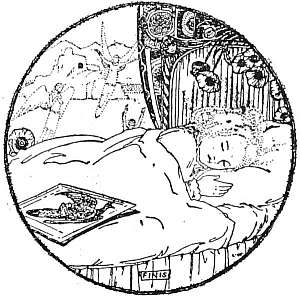
APPENDIX
NOTE I
THE FROG PRINCESS
This is certainly a "Nature story." The princess and her attendants are clearly personification of the elemental forces. The classical scholar cannot fail to be struck by the likeness of her metamorphoses to the story of Peleus and Thetis. Indeed the "Protean myth" so repeatedly occurs in these primitive Slavonic stories that it is impossible not to suspect a common origin.
NOTE II
PRINCESS MIRANDA AND PRINCE HERO
The old woman "Jandza"—which word Polish dictionary-makers translate by "fury"—appears very often both in Polish and Russian fairy tales, as a witch of witches. She is sometimes "Jaga"; and seems pretty malevolent, though capable of serving those who know how to manage her.
This story—probably a symbolic one—of the Spring and Winter, or the triumph of Light over Darkness, might be read at the present moment into an allegory of Poland, overrun, her people oppressed, starved, and all but extirpated by the malignant spirit of German militarism. Princess Miranda, herself unsleeping, awake, and watching, while all is desolation and despair around her, might be taken for the[95] Spirit of Poland herself, undying, but waiting for deliverance. But where is the Prince Hero, who shall deliver her?
Princess Miranda—her name is cud-dziewica, i.e. "Wonder Maiden"—but is not "admired Miranda" the most obvious rendering?
NOTE III
THE WHIRLWIND
The name of the heroine "Ladna" signifies "pretty" or "beautiful" in Polish. It is not the word originally used; but being nearly equivalent, and of similar meaning, appears preferable.
The prince's name "Dobrotek," signifies "good," or "benefactor." Being easy of pronunciation, but not easily Englished into a proper name, it seemed best to retain it.
The whole story has a very Eastern cast. The mention of the "Seven seas," and the high mountains beyond them, suggest Persian or Indian influence. The ugly dwarf, with the long beard and diminutive stature, seems a malignant "Jinn," and to have his counterpart in a well-known legend of the Arabian Nights. But this is not the only Polish tale that gives this impression; more than one appears directly taken from these tales.
P. 50. "The Water of Loosening." Loosening is not perhaps an exact rendering, which is rather "unstiffening," or destroying the rigor mortis, as a preparative to healing[96] a mortal wound, and breaking the sleep of death. These three waters always appear in stories, where this incident is used.
NOTE IV
THE PRINCESS OF THE BRAZEN MOUNTAIN
This story is rather freely translated, and much shortened from the original. There is much pious reflection, too long for insertion. The conversation between the prince and the sorcerer-miller is somewhat changed as much of it seemed rather irrelevant to the chief interest of the story, and lacking in pithiness.
The story of a supernatural maiden, compelled by the theft of her wings to remain temporarily as a mortal with a mortal husband, has its counterpart in many lands. The oldest perhaps is a Persian story, related in Keightly's "Fairy Mythology," of a Peri, who being thus entrapped, lives several years as an ordinary woman; but accidently finding her wings again, puts them on, and deserts her mortal husband and children, remarking as she does so: "I loved you well enough, while we remained together; but I love my former husband better"—and so vanishes away to Peristan.
The parallel legend of "Little Sealskin" will readily occur to memory.
THE END
